#sherlock love I know society is hard but please at least don’t be mean to watson
Explore tagged Tumblr posts
Text
Sherlock Holmes at any given moment:

#sherlock and co#sherlock love I know society is hard but please at least don’t be mean to watson#he will probably kill a man one day for you and your case#just saying so don’t look at me surprised when john will be pointing a gun at someone#these are the rules of every universe that those boys belong to each other#one day you’ll all understand what a destiny is#john watson#sherlock#sherlock holmes#goalhanger#goalhanger podcasts#johnlock#sherlock & co
293 notes
·
View notes
Text
Mary, Mary, Quite Contrary
Sherlockians, I want to talk about Mary. Or not about Mary the character, because enough words have been spent on that topic and I’m nowhere near brave enough to wade into that one on a snowy Sunday afternoon, but rather on the way we as readers can (perhaps should) relate to her. At some level what follows is about this Tumblr post, where an anonymous commenter asked for “any fics where Mary’s not the bad guy” and noticed that a lot of the evil-Mary fanworks “gets a bit misogynistic in my opinion”; but I’m also using that as something of a springboard, and don’t mean this as a direct reply to that post. (Which is why I’m not replying in a reblog; please everyone go check out that post and comment on it as well.)
Anyway, let me start with two basic points that I hope are pretty noncontroversial.
Mary is an antagonist, at least some of the time.
Mary has at least some aspects of her character that are bad-making (more on what I mean by “bad-making” in a moment), or at least would be if she were a real person.
The devil’s in the details here, as it is with most things worth talking about, so let’s unpack that a bit.
(Long post is long, and so continued under the cut.)
When I say someone’s an antagonist, I’m not really making a value-judgment. I’m purposefully avoiding that word, “villain,” which calls to mind “villainous” as a description of their personality and character. An antagonist is just someone who plot-wise stands in opposition to the character. They’re wrapped up in the conflict our hero has to overcome.
Let’s take a pretty straightforward (and unrelated to our fandom, so hopefully less emotionally charged for a lot of us) example: the first “Hunger Games” book. Katniss is thrown into a gladiatorial fight to the death with twenty-three other teenagers. With the exception of Rue and (later in the games) Peeta, everyone else is an antagonist in relation to Katniss. She has to hope for their death and be prepared to kill them because their continued existence stands in the way of her surviving the games. Most are reduced to numbers with s knowing precious little about them – certainly not enough to think they deserve death. But they’re still antagonists because they’re obstacles the hero has to work past if she hopes to succeed.
Or take Draco Malfoy, in the early Harry Potter books. He’s a thoroughly unpleasant boy, spoiled and sniveling certainly, but I’d be hard-pressed to call him bad. His biggest defining characteristic is he stands up and tries to fight Harry; but often as not this comes down to inter-house squabbling and the only reason he and Harry are on opposite sides is how they were sorted. As we learn, given the way he was raised and the political situation he was raised in, it’s actually pretty admirable how on the periphery of the Death Eaters he stays. But he’s still the antagonist, he’s the one Harry has to outsmart or outperform or otherwise get around.
It's only natural we cheer when the antagonists fail. We’re primed to identify with the protagonist, after all, and their failure means the protagonist gets to win. Even if objectively know the antagonist doesn’t actually deserve to fail, well. That’s just kind of how stories work.
Getting back to Sherlock, I said it’s pretty noncontroversial that Mary’s an antagonist. So when I say that I don’t mean she’s evil, or even that she’s only an antagonist. But the woman shoots our star character in the chest. It’s her secrets and her very presence that drive Sherlock into exile (and drive Sherlock and John apart) for a second time, undoing whatever victory Sherlock achieved when he defeated Moriarty’s web. She’s certainly a problem to be addressed and worked past in HLV. In terms of canon and parallels with the Doyle stories, there’s quite a lot about her actions (particular in Leinster Gardens) that all but screams “Sebastian Moran.” Ergo: antagonist.
There’s also a quieter, more ordinary sense that I suspect will be more controversial but is worth talking about anyway. Like a lot of Sherlockians and Johnlockers, I’m a big fan of making space for John/Mary/Sherlock in happy OT3 land. I think Sherlock and John at least want some version of that in canon; maybe not romantically, but they like to imagine their being room in their lives for these different relationships to not be in conflict. But in BBC-canon that hope’s not really borne out. This deserves a full meta on its own, but briefly: when Mary observes that neither she nor Sherlock were “the first” (talking about Sholto), she situates them in competition for the same position in John’s life, rather than in distinct, complementary ones (which an OT3 seems to require); and when Sherlock notes at the end of TSOT episode that “we can’t all three dance,” he seems to come to a similar conclusion. I do love me some good Johnlockary fic, but I don’t think this is where the show was heading
At a more basic level, I’d actually argue it almost has to be this way with these three- at least if we’re to hold on to John and Sherlock being “the two of us against the world.” In the 1800s men and women had such different roles in society, a man would do very different things and relate in very different ways to his close (male) friends than he would to his (female) wife. So Watson could run off with Holmes and have adventure, then return home to Mary for the peaceful, even loving family life, without one really being in tension with the other. But by the twenty-first century those spheres aren’t nearly so different. Even if you don’t imagine them as lovers, it’s hard not to imagine a self-respecting woman today saying as Mary did in TAB, “I don’t mind you going; I mind you leaving me behind.” One of the biggest challenges for a modern Holmes adaptation (or indeed, for a modern consumer of the original Doyle stories) is how to balance Holmes’ and Watson’s private “intimate partnership” – however we understand that term – against (John) Watson’s marriage to Mary with all we moderns expect of that relationship in terms of emotional fidelity, equal partnership, shared future, etc.
Put more simply: Mary should throw a monkey-wrench in the mix; she should be something that must be accounted for and whose presence should affect how Holmes and Watson can interact. Not to mean her presence is incompatible with Holmes and Watson’s close and exclusive relationship, but at a minimum she’s a factor in need of an explanation. She can’t help but be antagonistic, at least to some interpretations of Holmes’s and (John) Watson’s relationship.
As I said, with antagonists, it’s only natural to cheer for the protagonists, which almost inevitably means rooting for the protagonists’ failure. At least we root for them being de-antagonized, converted into some other relationship to the main character. But if you’ve spent any time on AO3, you’ve probably come across fanfic focusing on the antagonists (*cough* Loki *cough**cough* Drary *hacks up a longue* Silm-fandom-this-one’s-for-you *cough*’s). We can be a thirsty bunch when it comes to our antagonists, for characters we by all rights should be primed to hate. And even at the level of primary-canon, one of the biggest ways the primary creator shows their emotional growth is by realizing their antagonists aren’t truly their enemy. Like most readers I had a tear in my eye as Cato suffered through the night, begging for death; and certainly I would have been outraged if Harry hadn’t saved Draco from the Room of Requirements in “Deathly Hallows.” Gollum’s treachery is explained and he is given his own completion; Darth Vader is spared by Luke and allowed to look on his son with his own eyes; and the Klingons, Cardassians, and Borg are given their own sort of redemption in Worf, Garak, and Seven of Nine.
All of which is to say: it’s understandable, even natural, why people would have a hard time rooting for the antagonist, but there’s a long history of fandom peoples steering into the curve on this one. So it’s also understandable, even natural, that people want to hear stories with them at the center, both new stories about them and also versions of the original canon narrative that don’t need them to wear the black hat all the time. Some folks want Mary, Sherlock, and John to all go crime-solving together. I personally think there’s sometimes a danger of turning an antagonist – especially one who is at least morally gray (and I promise we’re getting there) like Mary is – into a protagonist without wrestling with what turned them into an antagonist in the first place; so if you want to bring Mary back to the side of John and Sherlock you need to grapple with what pushed them into opposing roles in the first place, or else risk your plot feeling “cheap” and unearned. (In fairness, this warning could as easily be directed to Mofftiss as anyone in fandom!)
But at an absolute minimum, I think it’s pretty obvious that lots of fans want to imagine the antagonists as at the heart of their own stories, and lots of fan-creators have done a really good job of providing those stories. Just as a lot of fans will almost instinctively be drawn to hate them, well, if you want to go a different path you’re in good company.
Enough about protagonist/antagonist, which as I said is more about the role the character fills in the story than about their morality or character. This, for me at least, is where it really gets interesting.
Before we get started, though, I know a lot of people struggle against this idea of morality when it applies to fictional characters and fictional stories. They’ll point out (rightly) that just because they enjoy a non-con PWP doesn’t mean they approve of rape in real life; that their reading preferences come from a different place entirely than their moral judgments. But at the same time, a lot of people (equally rightly) struggle to enjoy stories that glorify things we don’t consider worth glorifying. It’s one thing to enjoy a story about Draco rejecting the Death Eaters, returning to mainstream wizarding society and joining the Aurors; quite another to imagine him dating Harry while he’s still walking around calling Hermione a mudblood.
Or getting back to the Sherlock fandom, a lot of people are most comfortable with stories with Mary’s the antagonist because she’s got a character history and just personality traits where, if we met someone like her in real-life, we’d consider her morally bad. Or on the flip slide, those fans who want a not-evil!Mary in their stories often like to imagine her as the kind of person we’d describe as good or redeemed or some such thing, if she were an actual person. Mary’s morality, at least the morality of a similar person operating in the real world (because --speaking as a former philosophy Ph.D. student who taught philosophical ethics for years-- let me tell you: talking about the morality of fictional constructs gets very messy, very quickly), seems to matter to a great number of fans. So let’s talk about that.
I said above I thought most people would agree, Mary had parts o her character that were bad-making. What I mean is there are aspects about her that tend to make a person bad, unless they’re explained by some other factor. I’ve got in mind something vaguely similar to W.D. Ross’s theories of prima facie duties (if any of you studied this in your Ethics 101 courses- you would have in mine). Basically, the idea is we have all these duties that apply to us, but they can seem to conflict, and we may decide (rightly) in any given situation that one or the other is the more important one for us to follow. The classic example is the duty to keep our promises and prevent suffering when we can. You can imagine situations where you can’t do both- for instance, if I promised to meet you for lunch and on my way to the restaurant came across a man who fell into a ditch and twisted his ankle along a deserted road, where it’s unlikely someone else would come upon him. If I stop to help him I’ll miss our lunch date and break my promise; and while I still have a duty to keep that promise, I think most people would agree it’s more important to stop and help the person. We’d all be hard-pressed to say if I helped the stranger, I’d failed at my duty to keep a promise; at least not in the same way as if I could have kept that promise and just chose not to. That’s Ross’s idea of prima facie duties: that we have all these general obligations on us, but which actually should govern our choices in any particular instance comes down to the details of that situation.
I think there’s something similar going on with Mary’s character. This is actually a good way to evaluate most of us morally, in my opinion, but it’s doubly useful when it comes to Mary because she’s simultaneously got so many troubling aspects about her that just demand some sort of justification, but at the same time, because Mofftiss really screwed the pooch here, we don’t really have the information we need to give a definitive answer. So it’s useful to say: here’s something about Mary that needs accounting for, even if we don’t have enough information to evaluate her definitively.
Let’s take Magnussen’s biggest accusation against her: “All those wet jobs.” Mary killed people on her own prerogative, and she left behind a lot of grieving relatives who would love their revenge – both a testament to the suffering she caused, and a real risk for John, the baby that will become Rosie, and everyone else in their orbit. But if that’s all there is to it, it’s not wholly dissimilar to John’s decision to shoot the cabbie. It may have been different, but we don’t have the information to know that; it feels different, but most because John was saving Sherlock (who we know), whereas if Mary was saving anyone, it’s not someone we the viewer have an emotional connection to. Still, to borrow a phrase from Ricky Ricardo, Mary, you’ve got some ‘splainin’ to do.
Or to take an even more serious charge, Mary shot Sherlock, was prepared to make John watch him die all over again and force him to go through that grief that so nearly destroyed him the first time around. Unforgiveable, yeah? The best shot at justification here is that Mary had somehow got herself cornered, so that shooting Sherlock was somehow an attempt to escape an even worse sitation. This really demands a full meta to dive in to, but very briefly, I think Mary never intended to kill Magnussen and was instead trying to intimidate him; meaning she couldn’t let Sherlock undercut her power, but equally she couldn’t leave Magnussen with the impression that John and Sherlock were somehow her partners; so shooting Sherlock was the best way to keep him from becoming a full target of Magnussen’s. If that’s the case, the whole showdown in Magnussen’s office becomes markedly similar to Sherlock’s decision to “kill” himself on the roof of St. Bart’s. Mary is willing to cause a lot of pain to avoid even greater destruction, but at the same time, the whole situation that compels this choice was fed by her limiting her options when she decided to intimidate Magnussen. Similar to how Sherlock, once he’s on the roof of St. Bart’s, has no better option than to fake his own death and leave John to grieve; but how he does have some degree of culpability for engaging Moriarty in the first place and egging on Moriarty’s destructive obsession with Sherlock.
My point isn’t that any of these parallels really hold up to scrutiny. Sherlock risked his own life in TRF (and John’s pain) while Mary was prepared to kill another. John was ready to kill “a bad man” to save our hero while whatever murders Mary committed were against unnamed people in undetermined circumstances, and narratively certainly don’t pull at or heart strings in the same way John’s heroic killing of Jefferson Hope does. But the point is, with Mary, so much of what a lot of fans object to involve these vaguely-told stories where whatever factors would excuse her actions just are left untold. What we can say definitively is “all those wet jobs” require justification. Mary’s willingness to shoot Sherlock require justification. These things are prima facie wrong (or bad-making, the kind of things that tend to make something bad in the absence of other explanations) and demand an accounting for.
I’m focusing on Mary’s violence more than what a lot of fans have identified as her abuse toward John. Partly, this is personal: I have my own experience with abusive relationships and don’t entirely trust my ability to parse similar dynamics in fiction; certainly I don’t want to tie that part of my past to public debate, and I’ve not worked out how to talk about Mary and John without over-personalizing it. But I will say, there’s a lot to be considered on that front as well, and people interested in thinking through Mary’s im/morality shouldn’t ignore it. As a starting point, inevity-johnlocked pointed to several of her old posts making the case that Mary was an emotional abuser. silentauroriamthereal’s fic “Rebuilding Rome” looks at a lot of these issues in a really powerful way if you’re looking for an exploration in fic form. I’ll just add, even if I thought Mary was justified and so “good” in some sense (and my internal compass is so screwed up, I’m not really qualified to tell at this point), the way she chose or had to lie about her past to John seems a particularly bad match for a man like him with his trust issues. So even if you think Mary is good, there’s a lot of justification for saying she’s still not good for him.
So what does this mean for reading fics involving a kinder, gentler Mary? First, I’d emphasize there’s no shame or judgment in reading what you want. Much as writers may choose to write about all kinds of things they’d disapprove of in real life, readers have that same freedom to scratch whatever readerly itch they like, with no need to defend that to anyone else. Kinktomato and all that. On the other hand, I know I personally enjoy stories more when I can lose myself in them, and – again, for me personally – it helps me do that if my values are at least compatible with what’s presented as praiseworthy. I don’t have to guard myself as I enter the story. So it’s definitely worth thinking about how comfortable you are with fiction that vilifies Mary or pardons her or something in between, because it may make it easier or harder to really immerse yourself in a fic.
Then again, maybe that’s just me. I am a rather persnickety chickadee with things like this.
I do know that many fandoms have an unfortunate history of coming down hard on the female competition to a popular slash ship. While I’m reluctant to apply “should”s to our consumption of fiction, I think there are genuine feminist concerns here. Not with thinking Mary’s bad/evil or even hating her, but hating her for the wrong. For me, it helps to imagine another character doing something similar, and think about why I would react differently if it was someone other than Mary doing the deed. Also to be aware of the details canon doesn’t answer decisively or answers different ways in different episodes.
(More than most characters, Mary does suffer from a really inconsistent characterization. I’ve often wondered if everything since HLV was Sherlock or whomever trying on different frameworks for her personality/psychology/what-have-you, to see which could account for what she did to him. First she’s a badass villain, then a Mycroftian operative, then a martyr, then a worldclass manipulator, and finally a sanctifier whose own personality was irrelevant, giving her imprimatur from beyond the grave. And that’s without throwing veteran/maths genius and happy homemaker into the bunch. Maybe the showrunners simply weren’t sure what they wanted to do with her. Whatever the situation, I do think we need to be careful about taking any one canon detail at face-value, especially with her.)
I’m also a little discomfited by this trend I’ve seen among Johnlockers, to write Mary as a monster as a way to lessen John’s pain at her… betrayal, I guess? Or just the loss at her death? I remember when a lot of fanfic authors back between S3 & S4 wrote about the baby being fake; or even after S4, as part of John’s “alibi” rather than a true detail. Or even just deciding the baby was David’s or some such. By itself, that could have been really interesting, but what I saw so often happening was people used that as a way to remove the complication of the baby. Or to let John skip the grief he’d feel if the baby wasn’t born healthy- for instance, if it didn’t exist, or died, or if Mary was killed or ran while she was still pregnant. The basic theme was if Mary didn’t deserve John’s pain, John didn’t have to hurt for so long or as deeply.
Complicated grief is a thing, though, and for a lot of people, grieving the loss of someone who hurt them and aren’t “worth” their pain seem to suffer worse and for longer, particularly if they also have to grieve the lost opportunity to make their peace with the person while they were alive. This doesn’t mean fanfic writers or readers have to give us some kind of sanitized Mary; certainly she has the potential to be a true east wind of a character. But I do think there’s a tendency to prefer a more evil Mary because this lets the story move past her or spares John some suffering often won’t feel true. It also runs the risk of disrespecting the suffering of people impacted by these kinds of losses. So while I think this kind of characterization can be really interesting and compelling, it also takes a lot of skill and thoughtfulness to do it well. Here be dragons.
For me, though, the point isn’t to be proscriptive, to say Sherlock fic writers and readers need to limit themselves to a particular read of Mary. Her character has such potential to give birth to such a wide range of fic. As a viewer of the show I wish the writers and other creators had given us more of a sense of who she was because I think it really contributes to my frustration with not understanding the story they were trying to tell. But as a (kinda-sorta-someday-once-again) fic writer, it’s a true embarrassment of riches. The trick, for those of us concerned about Mary’s ethics were she a real person, is to be aware of the dangers of reading her character certain ways and to be cautious around them if we want to play with those interpretations.
6 notes
·
View notes
Text
A snippet of my consciousness
It seems I am on the cusp of finally leading my life as much as anyone can lead their life. Highschool was a straightforward enough conveyor belt, but the end of the belt is unceremoniously inching closer—well I am inching closer to it; how predictable of me to incorrectly consider myself the object of attraction. Suddenly a day will dawn and I’m supposed to know what to do about it. Could the sun just stay still—another incorrect phrasing; I swear I’m caught up on my 5th grade astronomy. Could the Earth just pause enough for me to breathe without worrying whether that was oxygen well spent? Of course the physical repercussions of a paused Earth… probably not the best conditions for deep breathing. Probably time to start freaking out, or rather, amp up the freakiness. You cannot start something that is already occurring.
I had settled hard into my position on the conveyor belt, constantly moving along as outward forces ensured my progression. Now I am to be shoved from the nest with my foe being not gravity, but finding out the meaning of life. Anyways, that’s the foe my brain decided on conquering during last night’s panic attack. And apparently one mentally ill brain is not fit to surpass the musings of many much wiser predecessors. I move from this conveyor belt, reliable if only in it’s pain, to a world where there are no forces invested in my progression. I’d lie if I said I wasn’t going to miss this predictable life. Yes, I inched by without freedom, but there’s enough to stress over when I was making the bare minimum of decisions. When I stubbornly embraced unhealthy coping mechanisms, I was being rebellious. I was ruining something that was—by all accounts—theirs. But soon, soon I was to be given full responsibility for this joint creation that for so long I had been able to blame completely on them.
Them. How to define them? The world. Society (please read as pronounced by JD in the song before his death in Heathers; if you have no idea what I’m talking about, educate yourself you uncultured—though clearly in better mental health than myself—swine). Morris. I’d rather not think about society or the small sliver of it I have to put up with known as Morris, but my thoughts are constantly drawn to her like a moth to a flame. The flame being, in this case, panic attacks, mood swings, moments of numbness, all that lovely stuff. I’d take a flame any day… of course, I sometimes do.
It annoys me that if I live to look back on this time, I’ll be staring down a moody teenager whose make-up—when attempted—always looked like shit. The make-up is understandable, but why must my thoughts be copy and pasted from every child who ever thought they were grander than the rest because they had been cursed with the habit—obsession—of overthinking. This would make for a horrible book I presume. Everything in my life just happens in my head nowadays, I’ve got enough trauma stored up that I simply reflect and wish I could do something more. And it’s not the smart overthinking, like Sherlock’s ability of deducing, or at least the helpful and somewhat entertaining spiral of thinking ten steps ahead of everything. No, it’s just draining my brain of whatever optimism I started the day with by reiterating everything wrong with me, the world, society.
But how do you stop, when this way of thinking is what you consider keeping track of reality? My reality is understanding that my thoughts are unhealthy, uncalled for, and completely accurate.
I am completely useless.
Yes, my GPA would prove otherwise, but my ability to scam the high school system is moot when it becomes apparent that all these stupid little tests have been in an effort to prepare me to contribute to society. It feels like a cruel trick. To view everything as so utterly unimportant only to be smacked by the realization that not caring about the work your teachers have been begging you to become invested in wasn’t a rebellion against them at all; you were screwing yourself the whole time, idiot. I am completely useless. Morris would certainly agree—though not with so many words. Just a degrading few sprinkled here and there that collect until they cover every single thing I touch.
And the other people? They wouldn’t say I’m useless only because I don’t matter enough to form an opinion of. I’m not wrong. And boo hoo, I sit here and uselessly overthink, full of the conviction that I must have significance but refusing to stoop so low as to join the huddled masses that carve out meaning for themselves in this fake world. Everything feels fake, but why is that a problem anyways? Still, I refuse to “fake it until I make it.” To wear a cheeky smile. To conversate with people who grate upon my nerves—who cares about your nerves you are useless. My uselessness does not, apparently, exempt me from thinking I am better than others. Not better, just separate. And separate by my own doing.
Not my own wishes, but certainly by my own doing.
I refuse to branch out, put on a façade, because I am desperate for people to care about me; the true, ugly, twisted root of myself. That’s not fair, but I’ve been nursed to adulthood by phrases reminding me that life is anything but fair—so why can’t that unfairness ever fall in my favor? I just want people to care about me again, even if their care is as the conveyor belt dutifully caring about my monotonous progression. There’s Morris, but she doesn’t count. She cranks my conveyor belt forwards fueled but hate and misunderstanding. Ugh, a misunderstood teen—can I get any more basic? But being cared about, or to be honest being less basic, is never going to happen again. People die, people kill themselves, and the police will bag their bodies while talking about their lunch plans, only to die themselves while an unrelated conversation takes place above their cooling corpse.
There we have it, I’ve come upon the startling realization that people die. Yes, yes, you’re very smart. Now shut up.
This doesn’t make me special. Nothing makes me special because I am useless. But nothing has intrinsically made me useless. This isn’t a condition that has been thrust upon me. I’m too lazy—too scared, too tired, too full of excuses—to change. Should I remain complacent in my uselessness? It sounds lovely, to be okay with uselessness. But something, some flame within me that hasn’t yet been blown out, insists that I keep yearning for more. Are those the blows from moth wings that cause this flame to flicker? The flame isn’t enough to excite change, let alone growth, but it is enough to fuel regret over every minute I waste reflecting. The billions of neurons making up my brain can do the job of a mirror, probably akin to the scratched up kind found in dollar store make-up kits. Great.
The predicament, it seems, is whether I am a moth that, if it were to just set its sights higher, would flutter off after the moon, or if I am the sputtering flame destined to devouring moths.
1 note
·
View note
Text
Get to know me tag thing!
1. Dogs or Cats? Dogs FTW! Though I could maybe have a cat one day, depending.
2. YouTube celebrities or normal celebrities? I’m not sure YouTube celebrities count as celebrities, haha. And I certainly couldn’t name a single one, so normal celebrities it is. I have a hard enough time naming those. :P
3. If you could live anywhere where would that be? UGH it depends on the day and how I’m feeling, honestly. I live for the wide-open countryside, but I love the mountains and the forest, and I would love some small, historic old town where I could walk everywhere on cobblestone streets. It’s easier for me to say where I don’t want to live than where I do!
4. Disney or DreamWorks? Disney (especially now that it has Marvel and Star Wars), but honestly DreamWorks has some real gems.
5. Favourite childhood TV show? MY LITTLE PONY. Especially those old movies and that original 80s character style??? A+++ the new My Little Pony honestly failed hard in the style department (didn’t stop me from getting a stupid amount of the toys tho because they were so cute). :’D Then there was X-men and Spiderman, and later on Pokemon, Digimon, and Yugioh. ♥
6. The movie you’re looking forward to most in 2020?
I’m a sap for movies, I love them. so RAYA AND THE LAST DRAGON, probably on the top of my list next to whatever Star Wars is coming out then. Mulan, Artemis Fowl, Dolittle!! (omg that takes me back so hard) And probably some others I can’t remember.
7. Favorite book you read in 2019? I did not read a book this year. :sob: But there was some excellent fanfiction, some very excellent webcomics, and some very very excellent RPing <_<. Oh, there was a kids book, The Tea Dragon Society, which is super cute, highly recommend. Maybe next year I’ll get through my stash of backlogs. >_>
8. Marvel or DC? Marvel for movies, ANYTHING ELSE for comics. Tho the Wonder Woman and Superman movies have been super epic too, hmm. Anyway, I cannot stand these superhero comics, they’re convoluted and incoherent (and generic) as heck. You can find so much better stories and artwork elsewhere.
9. If you choose Marvel favorite member of the X-Men? If you choose DC favourite Justice League member? G A M B I T
10. Night or Day? Day, except for the part where I work during it, and so most of my worthwhile activities get done at night. XD
11. Favourite Pokemon? MEWTWO
12. Top 5 bands/artists:
Uhhh, there are a few country bands I actually like enough of their songs to recognize, except none of the names are coming to me OH WELL. Celtic Woman, that’s one artist for you. And Rockapella! That’s it, all I got. I just don’t pay attention to names. XD
13. Top 10 books.
OK HERE WE GO have I got the books 4U:
The entire Star Wars X-Wing series.
The entire Star Wars Mandalorian series.
The Wolfwalker series by Tara K. Harper ( @dingoat <_< )
Dragon of the Lost Sea series by Laurence Yep
Jeremy Thatcher, Dragon Hatcher by Bruce Coville
Song of the Lioness series by Tamora Pierce
The Pit Dragon Chronicles by Jane Yolen
All the Pern books by Anne McCaffrey
The Dinotopia books by James Gurney
The Belgariad series by David Eddings (loved all his stuff honestly)
A lot of those I read long, loooong ago so maybe I would have different opinions now if I re-read them. But boy did they influence me A LOT growing up.
14. Top 4 movies
STAR WARS especially Rogue One :sob:, How to Train Your Dragon, Sherlock Holmes (the recent movies), The Man from UNCLE (also the recent movie). This list will change by the hour. 8)
15. America or Europe? Europe. I live in America and it’s comfy and all, but really Europe has all the cool places going for it, AND ALSO public transportation, get your act together America.
16. Tumblr or Twitter? Tumblr FTW. I will never understand the point of Twitter, tho Blakk does have a Twitter account that he rarely uses. 8)
17. Pro-choice or Pro-life? What a great polarizing question for such an innocent Q&A meme; gotta wonder what the author was thinking. 8) I’m pro-you-can-have-whatever-opinion-you-want-as-long-as-you-don’t-inflict-it-on-other-people because it’s not your f*ing business to run their lives, pro-this-isn’t-worthy-of-becoming-law, pro-act-responsibly-in-the-first-place-and-use-birth-control, and, failing that because people sure as hell like to manufacture fake issues, pro-choice. Because just imagine thinking you get to determine what someone else gets to suffer (and literally pay for, $$$) for 9 months and then force them through the horrific physical ordeal of birthing a baby when they just. don’t. want. to. I mean, you might as well decide someone should just take an axe and cut off their own arm just because you want them to; it really amounts to the same thing. :/ (Please note, wanting to have a baby and being forced are two entirely different things. It’s an ordeal, regardless, and not something to approach unwillingly.)
18. Favorite YouTuber? No one, don’t care enough to remember usernames. XD
19. Favorite author ? I’m so bad with remembering names, but here are some I do, so they must be worth something: Timothy Zahn, Mike Stackpole, Kevin J. Anderson, and also the above listed authors, half of which I had to Google. 8)
Also ME, because I know I write well and I love the stuff I write!
Honestly also everyone I RP with (past and present) because yeah there’s a reason I’m addicted to this hobby. ♥
20. Tea or Coffee? I mean. Coffee, ok?? But like, also. TARO MILK TEA and a hundred other teas especially with cream and sugar, and the concept of High Tea is amazing. ... That’s mostly the snacks, BUT STILL.
21. OTP ? Blakk/Saare (old ship, many of you probably haven’t seen it, but it’s also my canon ship). Blakk also ships stupidly well with several other OCs ... you know who you are ... and also how much I wish they could also be canon ...
22. Do you play an instrument/sing ? Piano! At least I could, before we moved around 6th grade and I gave it up. But it was the one extracurricular activity I stuck with for a number of years. I’m sure I’m ridiculously rusty. Probably I can still read the music. 8) I can sing (mainly in the car), but it doesn’t mean I should. XDD
Tagged By: @dingoat, thank you!!! ♥♥♥
Tagging: @kaosstar, @princess-triton, @theanaideialegacy, @starrealis, @lhunuial, @empire-at-war, @ you! (I’ve been pretty awol lately in terms of interacting a ton online so I’m not sure who’s still around, haha!)
3 notes
·
View notes
Text
10 Tips on Writing Asexuality
It’s been a long, long twelve years since I first realized I was asexual.
I’m one of the fortunate ones that realized my lesser-known orientation without having to go through years of confusion, uncertainty, and experimentation (because while some might enjoy that, I can pretty much guarantee I wouldn’t have). I was fourteen when I first came across the term and thought it might apply to me, and shortly before I turned fifteen, I officially claimed it as my own.
A lot has changed since then. When I first came out, there was almost nothing out there for asexuals. There was the AVEN website, a few blog posts, and even fewer YouTube videos, but the word basically didn’t exist in common knowledge, even among people who identified as LGBTQ+. Any fiction that included ace characters was almost exclusively unconfirmed, and left up to fans to compile lists of evidence that a certain character was probably asexual—which was usually ignored by the majority of fans, who wanted to see the character in sexual situations, and often later brushed aside by the creators.
Now, asexuality is more and more recognized by the popular media and the general public. Visibility is still lacking, but we’re recognized by major LGBTQ+ organizations, represented (to a small extent) in Pride events, and increasingly represented as characters in TV shows, books, movies, etc. I’ve even found random strangers recognizing the asexual pride button on my purse—and I live in the Bible Belt.
And it’s a great feeling. Every time I see another ace character in popular media, I get a little burst of joy to see someone like me—at least in this one way, if not in others. I’m especially glad to see good representation, especially after years of representation that was questionable at best (Sherlock still comes to mind) and harmful at worst (does anyone remember that episode of House?). I’m also thrilled to see that non-asexual people are really interested in doing ace representation right and are reaching out to asexuals to get their take on what they want to see.
So I thought I would include my perspective on writing asexual characters, because frankly, everyone’s experience and viewpoint is a little difference, and I hope this conversation continues with as many diverse voices as possible.
I hope these tips are helpful and make you at least a little more confident about including ace characters in your own work!
1. Watch out for stereotypes, but don’t throw them out the window. This is almost certainly confusing, so let me explain: I often see people try so hard to avoid stereotypical traits in asexual characters that they forget that aces are incredibly diverse. Yes, not all asexuals are aromantic, but some are. Yes, not all asexuals hate close physical contact, but some do. Yes, not all asexuals are shy or socially awkward, but some are. Yes, not all asexuals have seventeen cats, but some do. Yes, not all asexuals are repulsed by sex, but some are. And the list goes on. You should absolutely be aware if a character trait you’ve chosen is stereotypical, but that doesn’t necessarily mean you should avoid it, especially if you have more than one asexual character. Be aware of it, but focus on writing a well-rounded, realistic character over avoiding every stereotype in the book. No matter what trait it is, if you’re writing it well, chances are good there’s an asexual out there who will empathize with it.
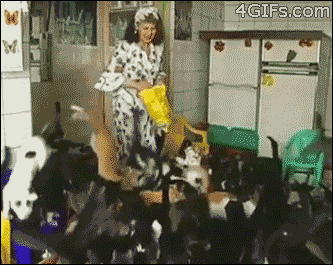
2. Keep intersectionality in mind. Though, as I said, I’m absolutely thrilled to see more ace characters in media, I know there’s still a desperate need for more diverse examples of asexuality, especially those that take into account how people of different races, genders, abilities, national origins, religions, and ages—among other things—experience their asexuality. A man does not experience asexuality the same as a woman. A white person does not experience asexuality the same as people of other races—I can’t list them all here, but from what I’ve seen, every racial identity comes with stereotypes and prejudices that interact with asexuality differently. Someone’s religion might affect how they view their asexuality or how they’re viewed by their religious community, and someone’s asexuality might be brushed aside if they’re “too young,” “too old,” or have a disability. Personally, I am an able-bodied American white woman, so I can’t say a lot about this specifically, but please do your research on this aspect of their experience just like you would any other. It might not be what you’re expecting.
3. Don’t make asexuality their defining trait. Unless someone is an asexual activist (and these are valid characters!), and even if they are, they’ve probably got quite a few aspects of their life that have nothing to do with their orientation. An asexual doesn’t spend all day every day thinking about the fact that they don’t experience sexual attraction. It is, after all, the lack of an experience rather than the presence of one, and is therefore less likely to draw their attention at any given moment. Contrary to some people’s belief, asexuals don’t necessarily have “oodles of free time” since they don’t spend it thinking about sex—but they do have other things that interest them. They are full human beings, just as complex as anyone of any other orientation, and as a certain lesbian character from a TV show I’m fond of once said, “My sexuality is not the most interesting thing about me.”
4. Remember that there are many ways to “humanize” a character without giving them a love interest. This is one of those topics that isn’t exclusive to stories with asexual characters, but is still relevant to them. All too often, I’ve seen characters who seem cold, inhuman, or heartless made more “human” by falling in love, as if the ability to feel romantic and/or sexual attraction is what makes them “not a machine.” This idea goes back at least a century, to Arthur Conan Doyle stating that Sherlock Holmes was “as human as a Babbage’s calculating machine, and just as likely to fall in love.”
Let me make this very clear: a character is not inhuman because they don’t feel romantic or sexual love, and a character is not especially human simply because they do feel these things. Even if your character is not asexual, please don’t make the one thing that “humanizes” them be romantic/sexual attraction—and in the case of asexual characters, please don’t try to “humanize” them by giving them a romantic interest. Yes, asexuals can be romantic, aromantic, or anything in between, but romantic asexuals are no more human than aromantics. There are so many other ways to humanize someone: strong platonic attachment, caring for animals, passion for a social cause, love for the environment, and countless other possibilities. Obviously it’s completely okay for romantic or sexual attraction to be one of these things: but please don’t make it the only one.
5. Think about how they discovered their orientation. Even if your character has known they’re asexual for 50+ years, unless your story takes place in some great fictional society where non-straight orientations are openly welcomed and accepted as normal, how they figured out their asexuality is probably going to affect them—as well as when they figured it out. I discovered my own asexuality in my early teens, but I’ve seen people who didn’t discover the term until they were senior citizens, having felt alone and out of place their entire lives with no idea why. If they discovered it recently, especially after a long time of not understanding themself, they might still be figuring out exactly how they define their own identity.
6. Consider asexuality in the context of your character’s environment. Small-scale and large-scale. Where your character grows up and what environment they live in during the story makes a huge difference on how their asexuality is expressed, and this is true whether you’re writing historical fiction (where views of and experiences in asexuality are obviously very different) or whether you’re deciding if your character’s family is supportive. There’s an enormous spectrum of variation in this, so I won’t even try to go into the details, but keep in mind that whether your character is out, what sort of prejudice they face, and how they feel about their own orientation will all be greatly affected by the world they live in and the people they know.
7. Asexuality is not an illness—but that doesn’t mean life experiences can’t affect it. Remember the House episode I mentioned? For those that never saw it, the patient-of-the-day was an apparently ace woman, married to an apparently ace man, who goes to see Dr. House. House is convinced that no human could possibly be asexual, despite another character, Wilson, mentioning research validating the orientation. In the end, House discovers that the man has a brain tumor suppressing his sex drive and the woman has been faking her orientation to stay with her husband.

This is … extremely problematic for what I hope are obvious reasons. This led to a lot of families and friends of asexuals, who had previously been supportive, suddenly worrying that their loved ones had brain tumors. Obviously, if there is a genuine reason to suspect a medical issue (such as a sudden disappearance of sexual interest when it existed before), one should consult a doctor, but this episode presented only two cases of asexuality, one of which was “just an illness” and another of which was a lie. This led viewers to the same conclusion that House himself reached: that no healthy human being could possibly be asexual.
This is a very bad example of asexual representation, but it’s also worth mentioning that there are asexuals who view their asexuality as being affected by their life experiences, a specific diagnosis, or even a chronic illness, and as long as you do research beforehand into what sorts of experiences can contribute to someone’s identity, and don’t try to “cure” that character’s asexuality as part of your story, this is okay. Ideally, include more than one ace character as a way to make it clear to your readers that experiences differ, and that all roads to finding one’s identity are valid. Sexual orientation is unlikely to change and can never be “cured”—since it’s not an illness in itself—but that doesn’t mean the environment can’t affect it.
8. Exploration and questioning is okay. I also want to emphasize that it is completely okay to have a character that is questioning their sexuality, and either later decides that they are ace or decides that they are not ace. As long as asexuality is treated as a genuine orientation and not just a “symptom”—and again, ideally, more than one ace character is included at least briefly—a character realizing that asexuality isn’t the right identity for them, or only realizing such after exploring other identities, is fine. As mentioned above, the House episode did this very wrong, but as long as you are not “disproving” the asexuality of the only two ace characters in the show—especially when it’s disproved by a guy who believes asexuality is impossible/inhuman—and you are sensitive and respectful, I think this can be done without causing offense.
9. Remember that ace views of attraction can be different than non-ace views. Much of society (at least Western society) seems to lump all attraction into one form: sexual and romantic combined. As asexuality gained more visibility, the idea of romantic and sexual attraction existing independently became more popular. On top of this, other types of attraction got more recognition: for instance, strong platonic attraction (like a non-romantic crush), sensual attraction (the desire for non-sexual physical contact), and aesthetic attraction (the attraction to the physical appearance of a person or object, but no desire for interaction). Note that this isn’t an asexual-exclusive experience, and a story definitely doesn’t need ace characters to explore these topics: many non-aces do experience these varied types of attraction, but haven’t had as much context to recognize or explore them. Asexuality, in recognizing that there are human beings with no sexual attraction, helped open the door to these ideas, but they have always existed. And even though this doesn’t necessarily relate to ace characters, I think it will go a long way to helping asexual experiences of attraction be better accepted.
10. Asexuality is a spectrum, and it’s more than okay to write all along it! I’ve been referring to the most general idea of “asexuality” in this post—probably because I fall completely in that category—but asexuality isn’t as simple as that, and the line between “ace” and “non-ace” isn’t so cut and dry. “Grey-asexuals” are a big part of the ace community, and their experience is both similar to and different from people who just identify as “asexual.” There are also demi-sexuals, who feel sexually attracted only once a strong emotional connection has been formed—and yes, these people deal with a lot of the same issues as asexuals, though of course, many parts of their experience are also unique. Keep this spectrum in mind as you’re writing your characters, even if you do end up writing someone who just identifies as “asexual.” It’s important to remember that the spectrum exists, if only because it’s a reminder that all of us, ace, non-ace, or anywhere in between, are part of the same immensely diverse gradient, instead of simply black and white.
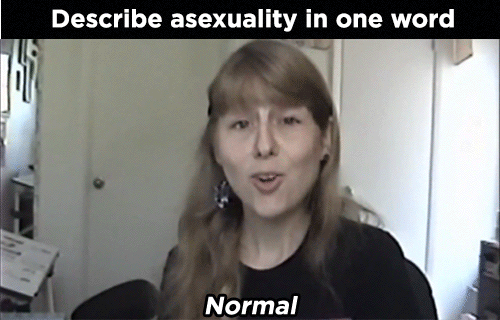
Original post on my website.
5 notes
·
View notes
Text
I've seen some posts going around about Crowley/Aziraphale being queerbaiting in the Good Omens series. I'm afraid I will regret writing this, but I have OPINIONS, said opinions being less about Good Omens and more about Tumblr not necessarily understanding the way audiovisuel storytelling and the queer community work, and maybe it's worth taking a moment to think closer about these things.
Spoilers for Good Omens (2019) and some allusions to the Discourse below the cut. Also, long post. You have been warned.
I probably should say here that I liked Good Omens, am myself aro ace, and am of the opinion that Crowley/Arizaphale is canon. So yes, personal bias exists, although I am going to do my best to be objective. Also, I haven't read the book yet, so am only going to be talking about the series.
(Ignoring hereby that they are supposed to be agender. It is a very good series, but they really, REALLY should have found a way to include that piece of information.)
This is a surprisingly complex question, that can be boiled down to three different problems: First, the way people analyze audiovisuel stories (in this case, television, but the argument also stands for movies), second, the term “queerbaiting” not being clear enough and also used too broadly, and third, people's still too narrow view of what is and isn't queer.
In this order, I am going to start with the way tv (and movies) work. It is the least controversial.
One of the things that I love about tv so much is just how complex and layered it is. There is what is directly said and shown to happen, but than there is the music, the acting, the costumes, locations, camera angles and editing, all of which have their own language and add something to how we will see a story. If you watch Good Omens, you'll notice that the exact nature of Crowley's and Aziraphale's relationship never is directly addressed or them confirmed to be queer. However, you will also notice the way they keep looking at each other, the fact that romantic music plays in the background for an awful lot of their scenes together, that they do and say things on a regular basis that goes further than the normal limits of a friendship, and the list goes on. This show is as clear about them loving each other very, very deeply as it possibly can be without directly talking about it.
This, of course, leads us to the question: What is and isn't text? What level of queercoding counts as representation? And this is where things get a little more complicated, because there IS NO clear line. People usually say that it doesn't count, unless the correct term is used. Which makes sense, given everybody's tendency to just... Idk, make a movie about somebody fighting his ex without ever telling us that he is, in fact, his ex, and than hope that they can get away with either the queer fans doing all the hard work of reading between the lines, or just write a couple of tweets about how they're totally gay and get credit for the representation.
Seriously, people, don't do that. If there is a way to use the terms, do it.
But there is a gray area. Welcome to Night Vale never labeled Cecil's orientation, yet we still know that he's gay. That scene they cut from Thor: Ragnarok of Valkyrie leaving the room of a woman? It never said that she was bi. I mean, I haven't seen it, but from what I know, I'd bet A LOT of money that, had they included it, people still would have complained about it not being clear enough. We still act as if including it would have confirmed Valkyrie's bisexuality. What about period pieces, set in times when certain labels didn't exist yet? And, finally, what if a relationship would actually benefit from being left vague and undefined?
There is no clear answer to this. It's a gray are, so feel free to just sit around and think about your own opinion on these things.
Which leads us to queerbaiting: Creators playing up the fact that they MIGHT have a queer character or relationship in their work for publicity, without ever planning to include it. It's a thing that happens both inside and outside of the story. In practice, this usually looks like putting in a lot of subtext between two same-sex characters, including suggestive scenes in the trailers, and going in interviews “well, they could be, it's an ongoing series, you'll just have to wait and see. ;) ”.
Queerbaiting is a VERY vague and very popular term, that is used very broadly, even in cases where it isn't exactly accurate. It is not exactly easy to tell what is actual queerbaiting, and what queercoding because Higher Powers wouldn't let the creators include openly queer characters in their work. Than there is of course the cases where queer characters are kind of there, but it's a blink-and-you-miss-it thing. I've heard the term “queercatching” used for that in a video. Also, queerbaiting is an accusation people like throwing around every time a show disappoints them by not making their OTP canon. (Stop doing that, PLEASE!)
In this context, it is understandably difficult to say if a certain ship is or isn't queerbaiting. However, I would argue that Crowley and Aziraphale are not. I haven't seen all the promotional things going on, so no idea how big of a selling point their relationship was. But I do know that everyone behind the scenes seems to agree that those two love each other very, very deeply, and the show itself isn't trying to hide it. On the contrary, it goes out of it's way to draw our attention to it. To anyone who is watching halfway attentively, it is going to be very, very clear that what those two have going on is NOT straight.
Which leads us to our final point: What is and isn't queer.
Oh dear. It is a topic that is still hotly debated within the community (at least on Tumblr), mostly by people trying to exclude certain orientations or keep other people from using certain terms.
Queer is an umbrella term used for members of the LGBT+ community, meaning “not straight”. It may refer to gender identity, romantic or sexual orientation, and things that don't quite belong in any of the boxes we have. The beauty of the term “queer” is exactly that it is so huge and so vague that it exceeds all boxes and definitions. A really handy thing to have, if you want people to know what you're talking about without needing to give them an hour-long vocabulary lesson first.
Please note here that so far, I have avoided using any labels for Crowley, Arizaphale, or their relationship. Please also not that while I did say that they love each other very deeply, I never used the word “romantic”.
Because here is the thing: I really don't think that they're gay. Or bi, or pan. Or anything else, really. They, and their relationship, like the term “queer”, fall outside of any predetermined categories. It is just, really, really, really clear that what's going on isn't heteronormative.
I have seen many aces being happy and feeling seen and seeing themselves in Crowley and Aziraphale in Good Omens. I've also seen many aros think the same thing. Because here is the beauty of it: We only know that they love each other more than anything else in the world. It is never said that that love is romantic.
I've also seen many allos completely miss this point.
Asexuality and aromanticism, as is to be expected from orientations that are defined by the lack of something, are still very invisible, both in RL and in fan circles. While we do have our own spaces and our own little community, mostly we are just there between our allo friends and... kind of stand and wait in a corner while they are busy with the sex and romance our society is constantly throwing at all of us. Being ace and/or aro is often confused with “being celibate”. We don't talk enough about what sexless or romanceless relationships could look like. No wonder so many people missed it when they saw one in Good Omens.
The queer community is STILL very strongly sexualized. And this is a problem, because while sexual attraction IS an important part of being queer, it is also not the only one. Queer people are still queer if they are not having sex. They are queer if they DON'T WANT TO have sex. They are queer if they don't enter romantic relationships. There is nothing straight about the close bonds aros can have with their friends. There is nothing straight about having a friend be the person you are emotionally closest to, close enough to openly beg them to run away together. Multiple times.
Queerplatonic or quasiplatonic relationships are the ones that are a bit difficult to define, because they are somewhere between “friendship” and “romantic relationship”. What they look like depends really on what the people involved want them to be like. Some live together, others don't. Some do things together that are usually considered to be romantic, others don't. Some kiss or have sex, others don't.
So far, I haven't really seen anybody really talk about the existence of queerplatonic relationships outside of ace and aro circles. And while I aggressively headcanon Sherlock Holmes and John Watson being queerplatonic, this was the first time that I've really seen an actual relationship onscreen that can be easily, or even best, read as being one.
But almost by definition, this means that it has to be vague, and subtle, and floating around somewhere around the lines separating friends from romantic partners. As such, I think that Good Omens did a really good job, giving us a relationship that is so obviously loving but also so beyond easy descriptions. However, this also means that it is easy to miss and end up feeling baited.
The problem is, I'm not sure that they COULD have done it better. Any explicit discussion about Crowley's and Aziraphale's relationship would have felt forced and out of place, and the term queerplatonic isn't enough known, they would have had to follow it up with an explanation of what that even is. And it isn't as if they could have made it any clearer how much they love each other as they did.
Some people say that they should have kissed onscreen.
Betty and Veronica in the Riverdale tv series kissed, and we all still know that it was only queerbaiting.
And isn't that, wouldn't that be, in the end, reducing queerness once more to the sexual bit in queer relationships?
I don't know. As I said, there is no clear answer, and in the end of the day, everyone is entitled to their own opinion.
I suppose, the best I can say is that what Good Omens did with Crowley and Aziraphale is very beautiful and well executed and also undoubtedly queer. It is, also, not enough. We still live in a time where we don't have much representation, and therefore all collectively jump on anything we can find. As long as this is the case, people will always be unsatisfied with everything. We need more. More explicit, more sexual, more romantic, yes, but also more quiet and subtle and undefined loving ones.
Anyway. I just had to write my opinion on this, because I REALLY didn't like what looked like a group of people dismissing a queer relationship because it wasn't sexual. This isn't even about Good Omens, not really, more about Tumblr being generally Tumblr and not seeing nuance and not thinking things through.
So... Please learn how to properly analyze audiovisual stories. Please be more careful and think a little before you start throwing around the term “queerbaiting”. And, please, PLEASE take a minute to think through if what you are doing isn't in fact sexualizing queer people and excluding parts of the community because of a too narrow definition of queerness.
And finally, PLEASE leave Gaiman alone. One, he has no obligation towards you whatsoever, and two, this was originally a thirty year old book that, three, he co-wrote with a now deceased friend. Being critical of media is one thing, and obviously, Good Omens isn't perfect. But... Just think about what you're doing before you do it, ok?
#good omens#crowley/aziraphale#my opinion#long post#queer representation#queerbaiting#queerplatonic ships#asexual#aromantic#aro / ace relationships#it's not many people who said it#and there are always some idiots who don't agree with me#in the end of the day#it's up to personal interpretations#but this is a bigger and more structural problem#and good omens just gave me such a good reason to talk about it
17 notes
·
View notes
Text
@yikes-trademarked
i mean yeah, the post has nothing to do with it just comes across as a bit of a slap in the face to people who are genuinely oppressed in a modern day society. how are asexuals ‘neglected’ and ‘isolated’? so most people experience sexual attraction and you don’t, whoop de doo. nobody actually cares if you do or don’t experience sexual attraction. if you could please give me an actual, real life, not someone-calling-you-a-plant-online example of asexual discrimination then i’ll take back my words
___
@yikes-trademarked I super love how instead of apologizing you are doubling down. Okay. I'll give you examples. Here are some general prejudices that affect aro and ace people. They aren't in any real order.
•Until the DSM V asexuality was considered a mental illness. Despite the fact that now we are "allowed" to "identify" as asexual HSDD (Hypoactive sexual desire disorder) is STILL considered a disorder. So instead of trying to help a person accept themselves as asexual allosexual (nonace) doctors will try to "fix" someone if they want to. Asexuality is still seen as something to be cured. It is still a dysfunction in their eyes, they just hide their prejudice a little better.
•Asexuals have been harrassed and raped in an attempt to fix them. Asexuals and aromantics are often seen as a "challenge" to be harassed into affection.
•Mainstream Christianity discriminates against asexuals as they do other queer identities. Here is one quote from a document called "Asexuality and Christianity" produced for Asexual Awareness Week (the fact that we get "awareness" rather than "pride" ain't great either)
"While celibacy is officially considered a good stance in religion, declaring oneself disinterested in sex is often met with disapproval. Asexuals have been told that they are rejecting God's gift of sexuality, that they are just as bad as homosexuals because they are not 'normal'...or people decide to pray to God for them to be fixed or for the Almighty to send the right person for them to fall in love with."
Or from the horse's mouth "Question: What do you call a person who is asexual? Answer: Not a person. Asexual people do not exist. Sexuality is a gift from God and thus a fundamental part of our human identity. Those who repress their sexuality are not living as God created them to be: fully alive and well." This was written by two Jesuit priests David Nantais and Scott Opperman. In other religions this is also often true. I know more about Christianity personally but I know similar doctrines exist in Islam and Orthodox Judaism. Not to mention the notion that marriage is the only acceptable option in these religions (unless you are Catholic clergy) and children are a necessity. Hell, according to the conservative traditional gender roles of these religions even an otherwise gender conforming aro/ace doesn't fit (not marrying, no kids, no family, all that).
•Dehumanization from all sides. We are told to be human is to love and that love is nearly always put in romantic or sexual context. Indeed NOT being capable of or experiencing romantic or sexual love is often used as shorthand for someone being a bad person (As Dexter [from Dexter], for example, becomes more sympathetic he develops the ability to feel sexual/romantic love. Robots in fiction can be asexual and aromantic but only if you want to show them as apart from humanity. Once you want to make it clear they have a soul they have to experience some kind of romantic urge or longing. Like Data from Star Trek) An article in Psychology Today by Dr. Gordon Hodson Ph.D. (who specializes in studying dehumanization) postulates (with a study to back it up) that asexuals are the most dehumanized sexual minority.
•On the specifically romantic asexual front in many places do not consider a marriage valid until it has been consumated.
•In media in which asexuality and aromanticism are not proof of evil they are judged to be not real. Here is one of if not our first actual representation in media. In the film Nymphomaniac the SELF-PROCLAIMED asexual character turns out to be a rapist who the protagonist murders in what is supposed to be a "woo! You go girl!" moment. AT BEST this says asexuals aren't real. We're just sexually repressed misanthropes. It might also imply that asexuals are base animals who are waiting to strike. THAT IS ONE OF THE FEW TIMES THE WORD ASEXUAL IS EVEN USED IN MAINSTREAM FILM! I cannot think of a single other.
•We are erased constantly in real life and in media. Here are two examples of active erasure, Jughead Jones (canonly aro/ace in the comics and coded as such since day one) was straight-washed for Riverdale. You may say "oh maybe they didn't know" (which is bullshit) then consider example two: Sherlock Holmes. Holmes (who I adore) has long been one of the few characters that has been "allowed" to aro/aces, but when the creators of BBC's Sherlock were explicitly asked if he was aro/ace they said he absolutely wasn't.
This is part of what I am talking about. We are not allowed to exist. We are invisible.
•Asexuals and aromantics are somehow toxic in our mere existence. We make kids think it is okay to be like us and are poisoning their young minds. We hate sex and thus are against the sex positivity movement.
•"Virgin" is an insult and we are treated as constant children. Somehow we have failed to grow up and cannot be treated as adults.
•And here is what I was really talking about SOCIETY IS NOT MADE FOR US! CULTURE IS NOT CONDUSIVE TO OUR EXISTENCES! I didn't know asexuality was an option until I was about 24. And before that I, like many aro/ace people, put myself in a lot of situations and relationships to "fix" myself. To make myself normal. My first and only sexual encounter was one of the things that sent me spiralling into a serious depression. I didn't know that it was okay to not be interested and to say "no.". So I said "okay" because I thought it was what I had to do to be a normal teenager. I don't know if I ever shared that online before so congrats you got me so mad I revisited my personal trauma. From childhood we are told falling in love is the ultimate reward. As teens we are told we gotta get laaaaaid. As adults not being involved in a sexual/romantic (often indistinguishable) relationship is WEIRD and TROUBLING. I have been told by people who don't know I am asexual that asexual people are "too weird" or even "creepy." The idea that someone might not be capable of romantic love sets off people's red flags that said aromantic might be crazy.
•We are surrounded by sex and romance constantly. Constantly. It is inescapable. In your real life I want you to pay attention to romantic or sexual imagry and storylines around you. There is no break. No alternative. This is what I mean by "invisible at best."
•Also, we are denied a history. It is very hard to prove absence but often sexless figures are immediately dubbed to be gay/lesbian because of their lack of interest in "appropriate" gender. Forgetting entirely that asexuality and aromanticism are options. Then when the question is raised they maybe a figure WAS aro and/or ace we are told that we are """"stealing"""" history. There is like one person in history we are allowed: Nikola Tesla. I love him very much, but he also fits the bill as a weirdo asexual. Because anyone who was the least bit acceptable to society must be allosexual. An example in reverse, Queen Elizabeth I, Britain's most beloved monarch, who never married, never was romantically or sexually involved with anyone (aside from being assaulted as a teenager), and was in her era very famously THE VIRGIN QUEEN who used her virginity as part of her persona to great affect. She is not considered asexual or aromantic and never has been. I have seen a biographer bend over backwards to get away from that accusation including using an incident where an elderly Elizabeth flashed a dignitary to make him uncomfortable as proof that she was allo. We can't have this awesome historical figure be one of those creeps right?!
•i am not even going into the history of how "sexlessness" was historically treated, especially in women. Let me just say that "spinsterism" was considered a danger to children and young women.
•NOTICE I WENT THIS WHOLE POST WITHOUT MENTIONING ASSHOLES WHO USE THE DISK HORSE AND BAR US FROM QUEER CIRCLES EVEN THOUGH SOME STUDIES FIND ASEXUALS HAVE LOWER SELF ESTEEM THAN ANY OTHER QUEER GROUP AND WOULD REALLY BENEFIT FROM A COMMUNITY!! THIS POST IS ENTIRELY EXAMPLES OF NON ONLINE PEOPLE BECAUSE SOMEHOW YOUR CONSTANT ABUSE OR REFUSAL TO RECOGNIZE ABUSE IS A-OKAY BECAUSE IT IS PART OF "THE DEBATE" BECAUSE SOMEHOW OUR EXISTENCE IS ACCEPTABLE DEBATE!
These are just some examples. People are free to add more but I am tired. If you want links I will dig them up.
Sincerely,
Fuck you.
I apologize for the "fuck you" but the exclusionist attitude is so disheartening. It is bad for not only aros and aces but also the queer community in general. We should be in this together! Fighting for one another side by side! We should be there for each other for hardships and for celebrations. I think it is vital that exclusionists really examine what and who they are actually fighting against.
32 notes
·
View notes
Text
I reread the Sherlock Holmes stories at least once a year. Every time, I’m impressed with something new. I’ve really got to start a Holmesian side blog.
For now, enjoy what is basically me live-tweeting “The Problem of Thor Bridge,” although I actually read it a few days ago. Holmes is in his late 40s.
The story in short: A woman has been killed, and the family’s governess is accused, because the woman’s jackass husband is totally into her.
It was a wild morning in October, and I observed as I was dressing how the last remaining leaves were being whirled from the solitary plane tree which graces the yard behind our house. I descended to breakfast prepared to find my companion in depressed spirits, for, like all great artists, he was easily impressed by his surroundings.
We start off with an image of the moody, artistic, disconsolate Holmes, and a depiction of Watson, the guy who knows everything about him.
On the contrary, I found that... his mood was particularly bright and joyous, with that somewhat sinister cheerfulness which was characteristic of his lighter moments.
"You have a case, Holmes?" I remarked.
"The faculty of deduction is certainly contagious, Watson," he answered.
Every. Little. Thing.
Also, please note, sinister cheerfulness.
Watson: Holmes, you’re... happy. Good Lord, who’s been murdered!?
"... We may discuss it when you have consumed the two hard-boiled eggs with which our new cook has favoured us. Their condition may not be unconnected with the copy of the Family Herald which I observed yesterday upon the hall-table. Even so trivial a matter as cooking an egg demands an attention which is conscious of the passage of time and incompatible with the love romance in that excellent periodical."
Ooh. Victorian burn!
"I am getting into your involved habit, Watson, of telling a story backward."
Holmes’s pastime - casually insulting Watson.
Watson’s probable reaction:

By the way, let’s keep track of Holmes burns, shall we? So far he’s roasted both Watson and the poor cook at Baker Street.
"... A revolver with one discharged chamber and a calibre which corresponded with the bullet was found on the floor of her wardrobe." His eyes fixed and he repeated in broken words, "On—the—floor—of—her—wardrobe." Then he sank into silence.
Sherlock Holmes abruptly cutting off, repeating himself in staccato, then getting lost in thought and forgetting he was talking to someone. Just a day in the life of Dr. Watson.
When this sort of thing happens for a prolonged time, Watson has a habit of... falling asleep. Lol. Not that I blame him
Enter Bates, who is a manager for today’s client, Gibson, a gold mining magnate. Bates does not like Gibson.
"Those public charities are a screen to cover his private iniquities."
A breakdown of big business if I ever saw one.
Holmes doesn’t like Gibson either.
"What the devil do you mean by this, Mr. Holmes? Do you dismiss my case?"
"Well, Mr. Gibson, at least I dismiss you."
Holmes Burn Count: 3.
I sprang to my feet, for the expression upon the millionaire's face was fiendish in its intensity, and he had raised his great knotted fist.
Gasp! Someone makes a threatening gesture at Sherlock Holmes, something that surely happens with regularity!
Watson:

We learn Gibson has a crush on his governess, who is accused of killing his wife.
"I could not live under the same roof with such a woman and in daily contact with her without feeling a passionate regard for her. Do you blame me, Mr. Holmes?"
"I do not blame you for feeling it. I should blame you if you expressed it, since this young lady was in a sense under your protection."
Holy cheese whiz, Batman! Don’t hit on your employees! See! Even in a world without bills against sexual harassment in the workplace, this was understood!
"I've been a man that reached out his hand for what he wanted, and I never wanted anything more than the love and possession of that woman. I told her so."
"Oh, you did, did you?"
Holmes could look very formidable when he was moved.
Sherlock Holmes:
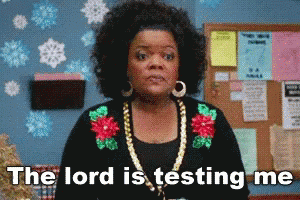
"I said that money was no object and that all I could do to make her happy and comfortable would be done."
"Very generous, I am sure," said Holmes with a sneer.
Holmes Burn Count: 4
On a side note, more Holmes actors should sneer.
"Some of you rich men have to be taught that all the world cannot be bribed into condoning your offences."
PREACH IT BROTHER.
"And women lead an inward life and may do things beyond the judgement of a man."
I love how this is just accepted in this time period. Gibson is speaking, and Holmes and Watson are gentlemen, but no one’s going to contradict this statement.
Man: does something completely against his character. Everyone else: How strange! There must be some reason. Meanwhile, Woman: does something completely against her character. Everyone: Well, she’s an illogical woman, what do you expect?
I mean dude. They talk this way in the original Star Trek, which had female character working in high-level positions (albeit not starship captain). And the “illogical woman” line appeared pretty much every time a plot involved a woman. It’s crazy how persistent a stereotype this was. At least “female hysteria” was still considered a Thing in Holmes’s time - by Star Trek’s time it had been dropped since the 1950s.
Anyway, I can’t understand a thing men do.
"[My wife] was crazy with hatred and the heat of the Amazon was always in her blood."
Whenever a character isn’t English, they are assigned some ethnic trait that usually makes them more passionate and unreasonable than English people. The English don’t escape critique, but foreigners definitely feel the burn the greatest. If an excuse can be found to blame something on a character being “tropical” or “fiery” because they’re from the Mediterranean or overseas, it will be used. And it’s usually a female character. (Though probably the one who gets it the worst is the poor Andaman Islander in The Sign of Four, who is a man, but barely even afforded humanity by the text.)
Holmes and Watson travel out to investigate. They meet the local police, who’s grateful to work with Holmes.
"And your friend, Dr. Watson, can be trusted, I know."
This is just how you react when Holmes shows up with Watson, since Holmes’s modus operandi is “Anything you say to me will eventually get back to Watson anyway.”
"Well now, Watson, suppose for a moment that we visualise you in the character of a woman who, in a cold, premeditated fashion, is about to get rid of a rival..."
So there’s an episode of House MD where House asks Wilson to envision himself as his patient, who is a middle-aged Chinese woman. Wilson is like “ok” and House says “Say it.” So Wilson says “I’m a middle-aged Chinese woman.” And House is like, “good.” And clearly it’s from “Thor Bridge” bwahahahaha.
"Your best friends would hardly call you a schemer, Watson, and yet I could not picture you doing anything so crude as that."
Watson Cannot Lie. It Is Known. At least, he cannot lie convincingly for more than a few minutes. Also, he is a Good Guy, Whom Holmes Trusts Implicitly.
(The Casebook has quite a few Watson-validating moments.)
"I can see now that I was wrong. Nothing could justify me in remaining where I was a cause of unhappiness, and yet it is certain that the unhappiness would have remained even if I had left the house."
^This is the governess, Ms Dunbar, teaching us all that a good deed never goes unpunished. I disagree with calling Ms Dunbar the “cause” of unhappiness, as the cause is clearly the husband. Ms Dunbar’s one bad decision was in not putting some form of distance between herself and Gibson. She seems to have thought they were safe as long as they were not being physically intimate, but other forms of intimacy were okay. And, to be frank, it seems not unlikely by the end that for all Gibson’s lack of morals, and in spite of her own, Ms Dunbar loves him back.
At the same time, she’s also right that no matter what choice she made, Gibson and his wife were not going to be happy together. It’s completely Gibson’s fault though. And the fault of a society where leaving a marriage left a black mark.
"How do you know [the murder weapon wasn’t already planted in your room]?"
"Because I tidied out the wardrobe."
"That is final."
Who is she, Marie Kondo?
Holmes did not answer. His pale, eager face had suddenly assumed that tense, far-away expression which I had learned to associate with the supreme manifestations of his genius. So evident was the crisis in his mind that none of us dared to speak, and we sat, barrister, prisoner, and myself, watching him in a concentrated and absorbed silence.
More of Silent, Pensive Holmes and his Rapt Audience. Watson won’t fall asleep when others are around, so instead they all stare at Holmes. Literally. That’s what it says. No one dares speak and they all just stare at him.
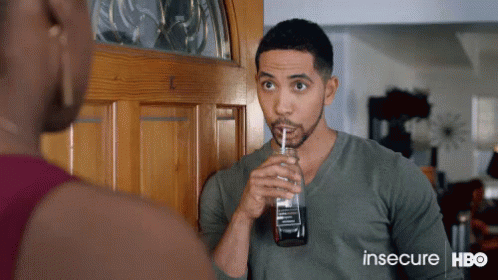
Suddenly, as we neared our destination he seated himself opposite to me—we had a first-class carriage to ourselves—
I like that Watson feels compelled to explain this to us this.
and laying a hand upon each of my knees he looked into my eyes with the peculiarly mischievous gaze which was characteristic of his more imp-like moods.
The body language in this passage. Holmes getting all silly and excited. Watson still just staring. This scene is probably the most Guy Ritchie-like it gets.
Also, please note imp-like.
Watson: Get your hands off my knees Sherlock Holmes you adorable fucker.
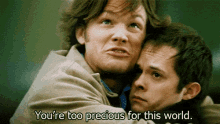
"Watson," said he, "I have some recollection that you go armed upon these excursions of ours."
It was as well for him that I did so, for he took little care for his own safety when his mind was once absorbed by a problem so that more than once my revolver had been a good friend in need. I reminded him of the fact.
"Yes, yes, I am a little absent-minded in such matters."
Holmes: Hey Watson, are you packing heat?
Watson: Well YEAH, you careless bastard. Someone’s got to prevent your death, since you won’t.
Holmes: YOLO
(Although, it’s more like YOLT, in this specific case.)
"See, Watson, your revolver has solved the problem!"
^After using Watson’s revolver in an experiment which results in the gun falling off the bridge into the depths of the river.
Watson: Thank you, Holmes. I liked that revolver.
Holmes: Psh, quit your bitching, we’ll drag the river for it.
In the end, it turns out the wife concocted a plan for her own suicide that would make it look like the governess murdered her. Although this story would definitely have been better without the racism and sexism, one thing that I can’t help but appreciate is that Gibson, a Generally Bad Guy, is not The Bad Guy, and gets to continue living his rich and ruthless life. On top of that, he’s even rid of his wife who wasn’t beautiful anymore, and potentially going to marry the beautiful younger woman. So he gets no consequences for treating his wife terribly, putting the moves on his employee, or just for being a jackass. Instead, he gets even More. It’s hyper realism. ACD ain’t pulling his punches with this one. /cynicism
And that’s it for “Thor Bridge!” This was very fun for me to do though I doubt anyone will read it! But I’ll almost definitely make more so I can continue to share the running inner monologue that goes on in my head whenever I read Holmes stories. I enjoy snickering to myself with or without an audience.
Our Holmes Burn Count was only 4, though I could have included a few more barbs he threw at Gibson.
This probably doesn’t need mentioning, but all the Sherlock Holmes stories are in public domain so y’all should go read them.
5 notes
·
View notes
Text
Sherlock and the media – Part II
When I wrote this meta about media’s role in BBC Sherlock, I wasn’t really planning to write a ‘Part II’ of it. But then all these great and thoughtful additions to it (see rb notes to the link above) were so inspiring that I can’t resist doing a follow-up. To me it’s easier to see patterns if I try to summarize and structure the various observations and comment on them topic-wise, as well as on a couple of things we seem to agree on. And please feel free to correct me if I’ve gotten anyone’s ideas wrong.
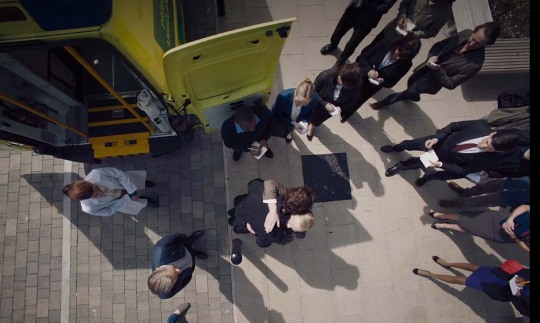
1. The depiction of media in BBC Sherlock is indeed mostly negative
@whimsicalethnographies points out, in addition, that media has the potential to be a positive force in real life, but that’s often not the case; a free press is essential, but the ability to navigate it is just as important. There’s a “huge critique of the media AND the way we consume it” in this show.
And I fully agree with this; media can (and should) play an important investigative and educational role if and when it manages to be an independent source of information. But we mustn’t forget that most of the media is commercial, that its primary interest is to make money. Which means that when the choice stands between trying to be objective and respect people’s integrity on one hand, and bringing sensational news that sell on the other, the latter will often be priority. And as long as we as readers don’t apply critical thinking, a lot of dubious ideas and outright lies will pass for truth, and we’ll tend to consume them and believe them unquestioningly. And I think we see several examples of characters that fall for this in BBC Sherlock, with the results ranging from relatively harmless (Mrs Hudson is now convinced she should never wear the colour cerise because of something a celebrity said on the telly) to disastrous (The Chief superintendent of NSY proceeds to arrest a man who has helped them for years, based on speculations inside his corps and gossip in the media).
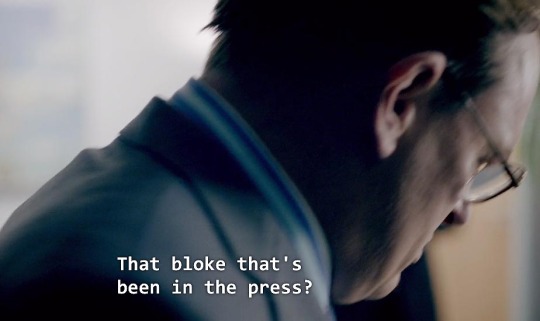
So, source criticism is incredibly important.
I’ll leave the rest under the cut for more patient readers, because this is quite long. :)
@raggedyblue observes that the press never looks well in Sherlock; it’s a “very powerful, two-edged sword” which has “the power to change” when taken critically. But it can also “turn people into herds of sheep” (which I believe CAM condescendingly says right out: ‘a nation of herbivores’).
@221bloodnun also sees an increasing role of media as villains in the show, where Mary appears to be the composite of them all. While John’s main problem is media’s representation of them, Sherlock’s problem is the villains, if I understand it correctly.
So yes; together these things make a terrible adversary for our heroes. I think we have it all in BBC Sherlock; villains who use media as a tool for their crimes (Moriarty), villains who thrive on media (Smith) and media itself being the villain (CAM). And then we have the trickiest part; Mary, who is supposedly in opposition to media (seemingly attacking CAM, seemingly a victim of his blackmail), but actually a big part of the problem (a glossed-over murderer).
@raggedyblue also mentions that one of the few press-related characters in ACD canon is Langdale Pike, who is both source and receptor for gossip. (And “strangely very similar to the description of Mycroft, both are sitting all day in the same place, and despite this, they always know everything about everyone”). In The Adventure of the Three Gables, Watson refers to the press that propagate Pike’s reports as “the garbage papers which cater to an inquisitive public.” (I guess their modern equivalents would be the tabloids?) And in Sherlock T6T, observes @raggedyblue, Langdale appears among the government’s codenamed people who helped edit the video of Sherlock shooting CAM. “That’s not what happened at all. But it is what will be told”. We’re not told who of the five characters present at the hearing is supposed to be ‘Langdale’, but my bet is on Mycroft. :)
To the few media-related characters from canon I’d also like to add Mr. Horace Harker of the Central Press Syndicate, the journalist in The Six Napoleons, whom Holmes lies to in order to take advantage of media’s influence on the suspect.

Holmes lets the journalist make a good story out of the idea that the police are on another track, and Watson comments it like this: “I could not but admire the cunning with which my friend had inserted a wrong clue in the evening paper, so as to give the fellow the idea that he could continue his scheme with impunity”. Manipulation involving media. Hmm.
2. The possibility that Sherlock might have faked his suicide to protect John from being destroyed by media, rather than snipers.
@sherlocks-salty-blog takes this even further: “That would explain why Sherlock is so willing to accept Mary in their life? to kill CAM despite of this could be a death sentence? why he was waiting his death in TST? And willing to acept Mary’s deathly advice to save John in TLD?“
Yes, I think you might be on to something there, @sherlocks-salty-blog. Sherlock behaves very differently in S3 and S4 in comparison to S1-2. He is far more passive towards John leaving him for another person than one would have thought after John’s string of girlfriends; Sherlock even organizes the wedding (something so ‘mundane’ that it would be the last thing I’d expected from him). And his acceptance of ‘Mary’ after her shooting and almost killing him is absurd, to say the least. And then even killing for her sake, telling other people that she is his friend in T6T, and taking blame and a beating from John for her death in TLD. Taken at face value, none of this in HLV and S4 makes an iota of sense. Which is why I believe that it’s all happening inside Sherlock’s head and that it’s actually about something else entirely; I think it’s about guilt, about The Fall and about ‘protecting’ John (and probably himself) from having to face the truth about their relationship, actually being honest to each other. It’s probably also fear of what the press might do to John if they would appear publicly as a couple. I think in general Sherlock feels haunted by the press, and he doesn’t like it one bit.
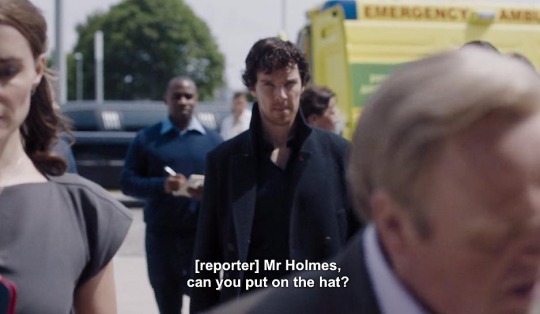
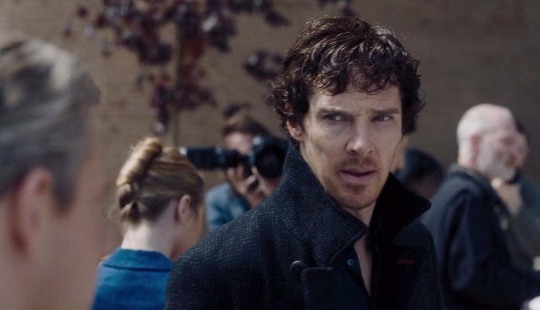
Another interesting observation from @raggedyblue is that CAM and the press are apparently not interested in Sherlock’s drug use; his relationship with John is seen as more scandalous and therefore pressure point. Yes I believe Sherlock learns this the hard way in HLV; you can’t always fool the media. Once they’ve picked up your scent they’ll keep digging. But the total disinterest from the press in Sherlock’s evident drug habits in TLD is still a bit suspicious to me; if anything, this is yet another piece of evidence that TLD happens inside Sherlock’s head. I think this might also be Sherlock’s internalized homophobia speaking; he has probably convinced himself that society will see his sexual orientation as worse than being a drug addict, thus he’s far more reluctant to talk to anyone about his true feelings for John, than about taking drugs. The drugs are rather the excuse, an escape from having to deal with his emotions.
3. As for Sherlock’s public persona, or ‘facade’, I definitely think media plays a role there:
@sherlockshadow recalls an interesting quote from TAB: WATSON: “That is the version of you that I present to the public. I write all of that, Holmes, and the readers lap it up. But I do not believe it. You are a living, breathing man. You’ve lived a life, you have a past. Experiences. Impulses”. To me this confirms that Watson’s chronicles in canon, as well as what we see in the BBC Sherlock show in general, are elaborated products rather than any kind of objective ‘truth’. So it makes sense that the authors would let Watson address this in TAB, which is kind of a mix between BBC Sherlock and canon.
According to @sarahthecoat, The Strand Magazine has become the lens through which we see Holmes, while Holmes himself remains unseen, as exemplified by Holmes hiding in the hansom in TAB.
Yes, I agree, and I think basically the same goes for John Watson’s blog in our times (except for the last post). The interesting thing about BBC Sherlock, however, is that many things are rather shown from Holmes’ perspective. In fact, I believe the whole show is. ;)
4. On a meta level of this show, might there be a message about the media?
@gosherlocked offers the idea that media might symbolize certain parts of the public, of public opinion towards people who are different in one way or the other.
Oh yes, I agree that this might definitely be the case; Sherlock says it himself about CAM (=media):
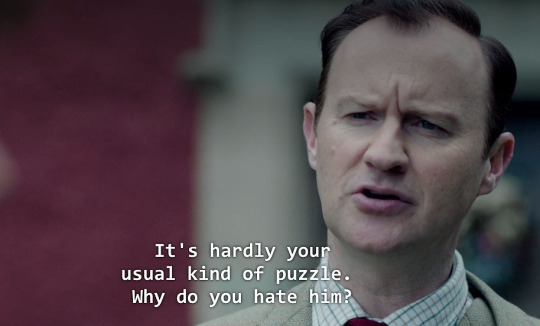


I think media’s behaviour in the show reflects the fact that the LGBTQ issue is constantly joked about and alluded to, but never addressed seriously. Kitty Riley’s prying into Sherlock’s love life or the papers calling John a ‘confirmed bachelor” in TRF are examples of this. I also believe that this is entirely intentional from the show-makers, because I think it’s meant as satire - maybe a kind of satire that (sadly) flies over the heads of most of their audience, and over real life media’s head in particular, but still satire; harsh, damning mockery. And I suspect that what they’re making fun of might be the hypocrisy of the public opinion, the parts of the audience that uncritically swallows whatever hetero norm rubbish of a storyline they’re served without even questioning it - including the part of traditional sherlockian fandom that would be apalled by the prospect of a gay Holmes. Seemingly ‘warm paste’ but subversive under the surface, I believe.
Another good point, made by @elldotsee, is this: “Oh! I also believe that TPTB are doing the same to us IN REAL LIFE. all the interviews, especially since s4 that insist that there was “never any romance” between John and Sherlock, that Martin and Ben never “played at being lovers”, etc etc. they’re using the media to make us believe the fairy tales, just like they told us they were going to in the show. Maybe this is their “big, ground breaking idea”.¨
Yes - that’s exactly what I think too, @elldotsee. I strongly suspect the writers are playing with us this way. In fact, I believe that the main purpose, the central message with this show is not ‘Johnlock’ per se; it’s not to give LGBTQ people their long due representation in the world’s most famous detective story (even if I do believe this will still be their endgame). No, I think this is a comment on the still very much lingering homophobia and heteronormativity, and just how easily people buy into media’s lies and fairy tales about it. I believe S4 is a Dystopia, as @tjlcisthenewsexy has pointed out earlier - a worst case scenario. But I think they’re very deliberately messing around with their audience, trying to teach us a lesson: ‘Think critically, do not just lap up everything you hear from media’.
The cast and crew can say just about anything in interviews, and next time contradict it, and real life media can twist it around a million times; it’s still only the work that matters.
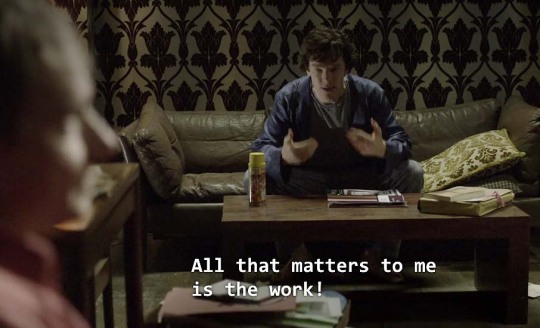
Therefore, If we want answers, we have to look at the actual show, not at what’s said about it in media.
(By the way @elldotsee , you wonder when John’s blog stops updating? As far as I know, that happens shortly after TSoT but before HLV, and Sherlock makes the last post when John is on honeymoon. I wrote about these things in my meta series ‘What happened to Sherlock?’ (X, X, X, X). John types on a jpg-file in T6T.)
5. About ‘straight-washing’
@tjlcisthenewsexy had a lot of interesting additions, some of which I replied to here. One of them was that S4:s function might be to ‘set the record straight’, just as Janine’s interviews about Sherlock being ‘as red-blooded as they come’, did in HLV, thereby denying any gay relationship between him and John.
@sarahthecoat points out something similar; that Janine’s ‘straightwashing’ of Sherlock in the press in HLV could be seen as a parallel to Mary’s ‘straightwashing’ of John by marrying him.
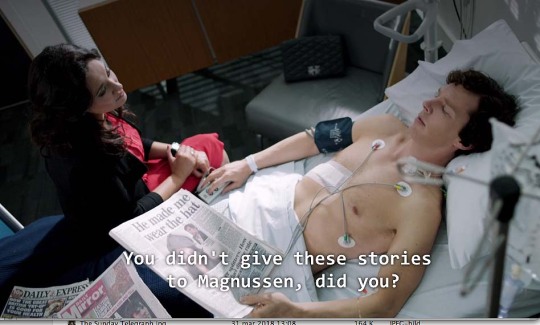
Come to think of it, that’s pretty much exactly the implications of ‘Mary’s role in canon and in Sherlock, according to this excellent analysis by @green-violin-bow: “And there you have it: the central problem of Mary Morstan/Watson, in both ACD canon and BBC Sherlock – she shoots Sherlock in the heart – or does she save his life?“ “Mary Watson’s presence provides Holmes and Watson with a lifesaving alibi”.
Which was probably the only narrative option for them in the Victorian times, where they would have been imprisoned if found together (and that would go for the author writing about them too). While in our time the same solution seems to me like an infuriating backlash, something we should never tolerate.
6. About media and power
@elldotsee lifts several good points, of which I find this one particularly interesting: The name ‘Napoleon’ is associated with three different persons in this show: 1. CAM is referred to as the “Napoleon of blackmail” in HLV 2. Moriarty calls himself the “Napoleon of crime” in TAB 3. Craig the hacker in T6T says that “Thatcher’s like – I dunno – Napoleon now”
To this I’d like to add the conversation between Sherlock and Faith in TLD (transcript by Ariane De Vere, my bolding):
SHERLOCK: D’you know why I’m going to take your case? Because of the one impossible thing you’ve said. FAITH: What impossible thing? SHERLOCK: You said your life turned on one word. FAITH: Yes: the name of the person my father wanted to kill. SHERLOCK: That’s the impossible thing. Just that, right there. FAITH: What’s impossible? SHERLOCK: Names aren’t one word. They’re always at least two. Sherlock Holmes; Faith Smith; Santa Claus; Winston Churchill; Napoleon Bonaparte. Actually, just ’Napoleon’ would do. FAITH: Or Elvis? SHERLOCK: Well, I think we can rule both of them out as targets.
And instead, Sherlock eventually comes up with the word ‘anyone’ as a target for the serial killer. Yes, because Napoleon wasn’t exactly a target, was he? He was rather the aggressor. Well, in the ACD canon story The Six Napoleons, busts of him are repeatedly smashed of course, just as busts of Thatcher is destroyed in both the episode TST and John’s blog post The Six Thatchers. But in the quote above, Napoleon’s name is also placed beside Winston Churchill, a famous British prime minister. This, in combination with the linking of two villains and Thatcher to Napoleon’s name, makes one thing rather obvious to me: that Margaret Thatcher is also seen as a villain by Sherlock, and the show; maybe she’s even seen as a serial killer. I think there’s a reason why these two names – Napoleon and Thatcher – are so emphasized in the show. Because they link three things together: Homophobia (Moriarty), Media (CAM) and the government (Thatcher). All of them can produce death if their doings drive people to suicide.
7. Kitty Riley
@ebaeschnbliah points out something that I hadn’t noticed at all: that the words ‘Make Believe’ can be found on the wall of Kitty Riley’s room in TRF.
Wow - fairy tales… ;)
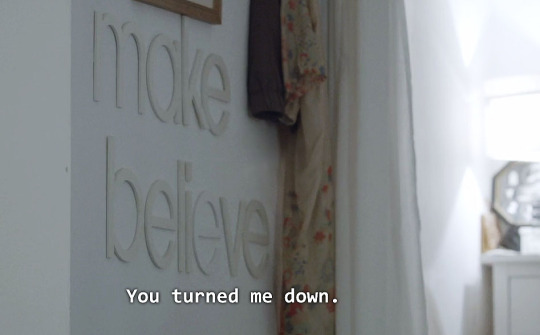
@tjlcisthenewsexy also brings up Kitty Riley and the bathroom scene, but then also says this:
“Sherlock WAS protecting John - protecting him from what Sherlock KNEW was coming very shortly. I mean it’s already in the show, really - “Sherlock is a fake” might as well read “They’re gay”. Kitty Reilly colluded with homophobia (in the form of Jim Moriarty) to put together that shaming article that supposedly lead directly to Sherlock’s suicide. Yep….it’s all in there”.
I do agree with this, and I’d like to linger a bit longer on Kitty’s possible role here, because I believe there’s definitely more to these events than meets the eye. There are so many weird things about the scene in her apartment, and the events leading up to it in TRF, that I can’t help wondering which parts of it are actually ‘real’. So let’s have a closer look.
First of all, John hasn’t written anything on his blog about the central case of TRF - the case that meant Sherlock’s supposed death - except this:

And then this: “But you know what happened? Sherlock saved the lives of two kids. Regardless of anything else, he did that. And they didn't even like him very much. If you really think that he was guilty or that Moriarty wasn't real then feel free to explain this “ (link to the post with Moriarty’s hacking of his blog).
But this makes me suspicious, because it doesn’t exactly make sense; why is it ‘too final’? Why is it so negative for John to write about this? Wouldn’t it be John Watson’s dearest interest to write up the truth about this case, trying to clear Sherlock’s name from media’s slander? That’s what he does in ACD canon, at least; he describes The Final Problem with the events at the Reichenbach Falls in detail, to let the world see that the slandering of Holmes by his enemies is completely false (excerpt from FINA, my bolding):
“It was my intention to have stopped there, and to have said nothing of that event which has created a void in my life which the lapse of two years has done little to fill. My hand has been forced, however, by the recent letters in which Colonel James Moriarty defends the memory of his brother, and I have no choice but to lay the facts before the public exactly as they occurred. I alone know the absolute truth of the matter, and I am satisfied that the time has come when no good purpose is to be served by its suppression. As far as I know, there have been only three accounts in the public press: that in the Journal de Genève on May 6th, 1891, the Reuter’s dispatch in the English papers on May 7th, and finally the recent letters to which I have alluded. Of these the first and second were extremely condensed, while the last is, as I shall now show, an absolute perversion of the facts. It lies with me to tell for the first time what really took place between Professor Moriarty and Mr. Sherlock Holmes”.
But apparently our modern John didn’t want to do this on his blog, in spite of having witnessed Moriarty’s whole performance in Kitty’s apartment. John must have plenty of evidence that show Sherlock’s real part in the case, and he and Molly assisted in the whole chemical analysis at Barts. And what about his own role; if Sherlock was arrested for kidnapping, wouldn’t John be his accomplice? But answering the vile attacks on Sherlock in his comment section John just says “Believe what you like”, and not a word about media’s role. In fact, the media is never even mentioned by John between TRF and Sherlocks return in TEH, in spite of having played such a damning role in Sherlock’s downfall. John does write up some other of their cases after this, but the kidnapping case seems taboo. I sense a kind of fear here; there must be things we’re not told. Was John under pressure?
The circumstances around Sherlock’s arrest in TRF look odd to me, to say the least; apparently he’s a suspect for having figured out how to save the kidnapped children, and because one of the kids got frightened when she saw him. But there’s no actual evidence that we know of, only Donovan’s very dubious speculations about a possible motive, based on an upset child’s reaction. And Sherlock made his deductions about the place at the police station, in front of everyone. Basically, they had nothing on him to hold water in a court case. How can anyone be arrested for kidnapping on those grounds? And if Sherlock wanted to avoid being photographed by the media when brought in by a police car, why not just take a cab to the police station by himself? After all, that’s what he usually does!
But instead, he sits and waits to get collected, and then he escapes together with John, and drags both of them handcuffed in front of a bus, based on the extremely risky prediction that the assassin might save them. Is it really worth risking John’s life to prove a point about a computer code? Weird... And then there’s Kitty. Why break into her apartment? This guy is now wanted by the police, and the first thing he does is committing a crime at the very place of the journalist who has been slandering him in the press? Anyway, when John and Sherlock arrive at Kitty’s apartment, the wisest thing to do would be to use any tool in her kitchen to immediately get rid of the handcuffs, right? And then perhaps search her apartment for clues? Nope. Instead, they just sit handcuffed in the dark, waiting for the journalist with her door open.
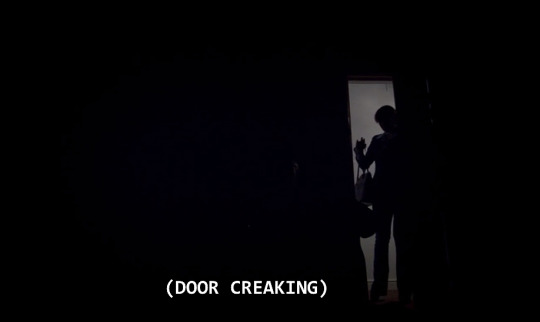
I think the symbolism of this is very apt; they’re closely and firmly bound to each other, but completely in the dark about it! :))) And then Media comes to reveal it...

More absurdities: Kitty shows them her still un-published article, as if this would be ‘proof’ that Sherlock is a fraud. Let’s take a closer look at it. This is her earlier brief news flash in The Sun, advertising the coming article:

Transcript: SHERLOCK: THE SHOCKING TRUTH - EXCLUSIVE
(Close Friend Richard Brook Tells All)
SUPER-SLEUTH Sherlock Holmes has today been exposed as a fraud in a revelation that will shock his new found base of [ado]ring fans. Out-of-work actor Richard Brook revealed exclusively to THE SUN that he was hired by Holmes in an elaborate deception to fool the British public into believing Holmes had above-average ‘detective skills’. Brook, who has known Holmes for decades and until recently considered him to be a close friend, said he was at first desperate for the money, but later found he had no [...]
And this is the still un-published manuscript that Kitty shows Sherlock and John in her flat - the document that Kitty calls ‘conclusive proof’ (together with some loose papers from Moriarty which do not look like cuttings from newspapers; the paper is entirely white and there’s no logo or date or similar evidence that they have actually been published):
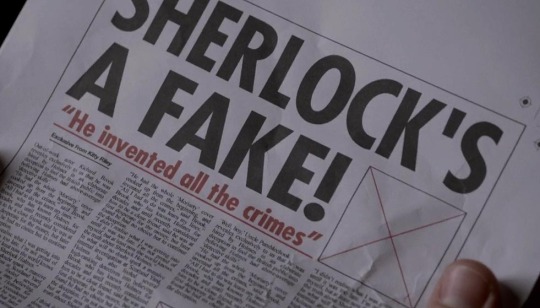
Transcript: SHERLOCK’S A FAKE!
“He invented all the crimes” (Exclusive from Kitty Riley)
Out-of-work actor Richard Brook reveals exclusively to us that he was hired by Holmes in an elaborate deception to fool the British public into believing that Holmes had above average ’detective skills’. “He had the whole ‘Moriarty’ cover cooked up from the beginning and invented all the crimes”, said Brook. “All I had to do was learn my lines.” Brook, who has known Holmes for decades and until recently considered him to be a close friend, said he was at [...] desperate for the money but later [...] he had no choice but to continue the deception. I didn’t realise what I was getting into until it was too late. I’m not proud of myself, but at least now the world knows the truth about Sherlock Holmes”. In what will no doubt spark a massive internal investigation at Scotland Yard, Holmes has also fooled several high-ranking detectives into believing.
‘Well boy’, Uncle Pumblechook [...]
But a closer look at Kitty’s supposed manuscript reveals that this same text (except for the ‘Uncle’ part) is copy-pasted and repeated again and again – this is indeed fake news! And we never got to know what evidence they actually had on Sherlock, the incriminating facts that ‘only someone close to Sherlock could know’ and that Mycroft supposedly ‘blabbed’ about to Moriarty. What was it about? His drug problems? Youth crimes? Mental health issues?Mythomania? I’m still at a loss to see how these papers could prove that Sherlock was a ‘fake’ who had ‘invented all the crimes’ without further details. The fact that we never get any specifics is extremely suspicious to me; what crimes exactly? Is he supposed to have invented Jennifer Wilson’s murder? Eddie Van Coon? Alex Woodbridge? If the crimes weren’t committed, what had NSY been investigating? Fake bodies? And if Sherlock was suspected of having committed them all, why wasn’t John suspected as an accomplice? It doesn’t make sense...
It strikes me, however, that Kitty’s most juicy bit that she wanted to publish about Sherlock, the one about ‘you and John Watson - just platonic or?’ is no longer mentioned in all this. Not a word about the ‘confirmed bachelors’ anymore - why is that? This is all about Sherlock, not John. I very much agree with @tjlcisthenewsexy here; “Sherlock is a fake” might as well read “They’re gay”...
‘Real’ newspapers
To give a more complete picture of media’s role, I’ve made a quick research about the different newspapers shown in BBC Sherlock; which are they and what do they say? It turns out that most of them actually exist in real life. Below is a short presentation and some of their headlines in the show:
The Daily Express (UK ‘middle market’, conservative tabloid)
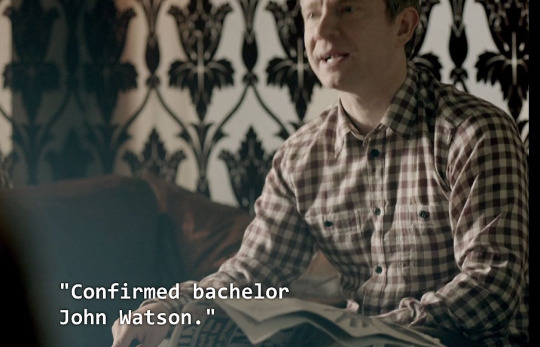
“Boy, 18, kills himself inside sports centre.” (ASiP) “Bachelor John Watson” (TRF) “Crime of the century” (TRF) “Moriarty walks free. Shock verdict at Old Bailey trial” (TRF) ”Shag-a-lot Holmes” (HLV)
Going by the insinuations about John’s sexual orientation, this paper is depicted as sensationalist in BBC Sherlock, which there’s also lots of evidence for in real life, in spite of being described as ‘middle market’ (see Wikipedia link above). It has been accused of xenophobia, among other things.
Sunday Express (belongs to The Daily Express. Known for controversies )
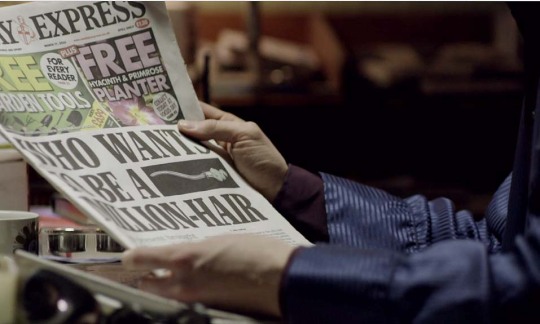
“Who wants to be a million-hair” (TBB)
Daily Star (’Redtop’ UK tabloid, known for controversies, same publisher as Daily Express)
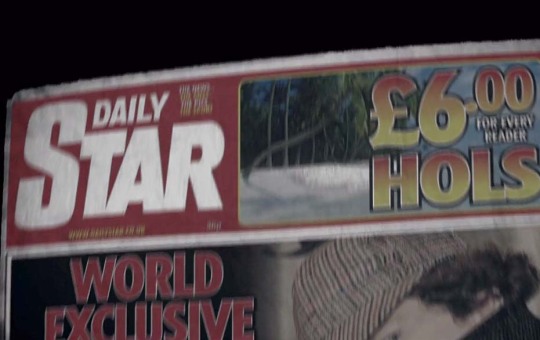
“World Exclusive Boffin Sherlock solves another” (TRF) “How was he ever acquitted” (about Moriarty; TRF)
The Daily Mail (British conservative ‘middle-market’ tabloid) REPORTER 3: Yes, but if they are murders, how do people keep themselves safe? LESTRADE: Well, don’t commit suicide. (The reporter looks at him in shock. Donovan covers her mouth and murmurs a warning.) DONOVAN: “Daily Mail.”
The Times (British conservative newspaper; not regarded as ‘tabloid’)

John looks at the article reporting Beth Davenport’s apparent suicide. Next to a large photograph of Beth is a smaller one showing the man who just visited the flat and identifying him as D.I. Lestrade. (ASiP)
The Daily Telegraph (aka The Telegraph. British daily broadsheet newspaper)
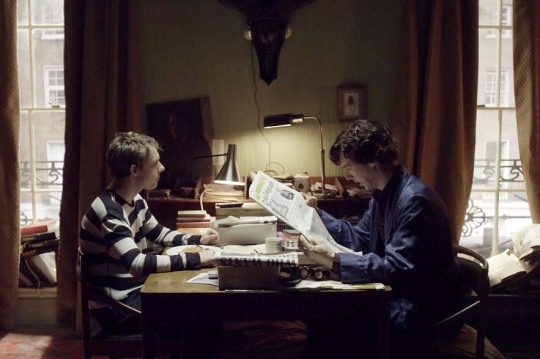
Sherlock reading, headline invisible (TBB)
The Sunday Telegraph (owned by The Daily Telegraph)
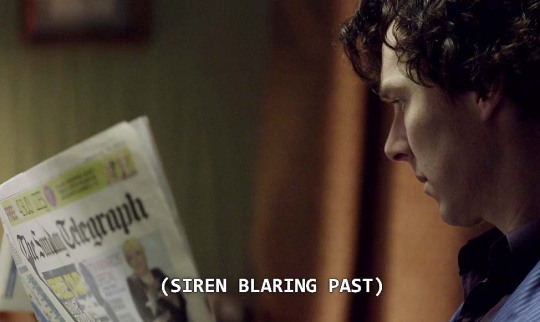
Sherlock reading, headline invisible. Picture seems to show Connie Prince (TBB)
Daily Mirror (British ‘redtop’ tabloid)
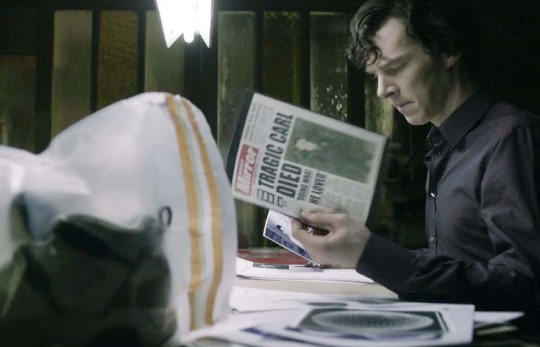
“Tragic Carl died doing what he loved” (Sherlock’s clip; TGG) “7 times a night in Baker Street” (HLV)
The Guardian (British daily newspaper known for liberal or left-wing viewpoints)

“Amateur detective to be called as expert witness. Scotland Yard calls upon ‘nation’s favourite detective’ in Moriarty trail” (TRF) “The case is riddled with irony and intrigue but perhaps reflects a deeper malaise that seems to be at the heart of a society” (TRF) “Shock verdict at trial”(TRF) “Moriarty vanishes” (TRF) “What next for the Reichenbach hero” (TRF) “Lord Smallwood suicide” (HLV)
The Sun (British ‘redtop’ tabloid, many controversies around misogyny, homophobia and Thatcherism)
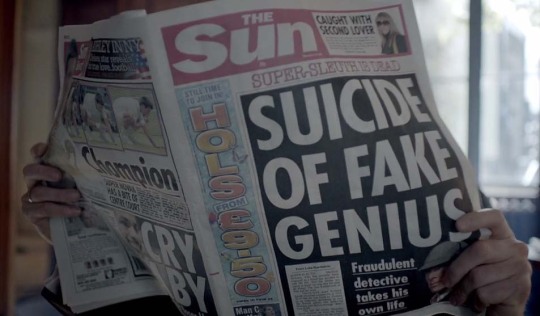
“Sherlock – the shocking truth” (by Kitty Riley, TRF) ”Sherlock’s a fake! ‘He invented all the crimes’” (unpublished, Kitty Riley, TRF) “Suicide of fake genius” (TRF)
Global CAM News (Invented newspaper, as far as I can see)

“Trepoff ‘Guilty’ Sensation!” (MHR)
The Independent (British newspaper, ‘social-liberal’; since 2016 it only exists online)
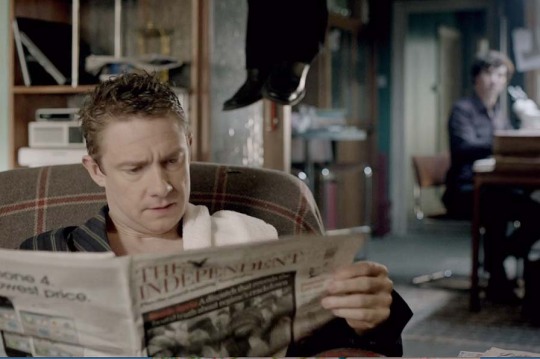
John reading, headline invisible (TRF)
When making this list, some of the newspapers reminded me of these lines from Tom Robinson’s satirical song from the seventies (my bolding):
Glad to be Gay (Lyrics) Pictures of naked young women are fun In Titbits and Playboy, page three of The Sun There's no nudes in Gay News, our one magazine But they still find excuses to call it obscene Read how disgusting we are in the press The Telegraph, People and Sunday Express Molesters of children, corruptors of youth It's there in the paper, it must be the truth
Three of these six newspapers and tabloids are figuring in BBC Sherlock, one of them (The Sun) highly contributing to Sherlock’s Fall by carrying false and defamatory news about him. And there’s also this, in the rooftop scene at the end of TRF:
JIM: “Genius detective proved to be a fraud.” I read it in the paper, so it must be true. I love newspapers. Fairytales.

This may be a complete coincidence, of course, but I did find some other possible references to Tom Robinson too, which I described in this meta some time ago.
OK, this is already a monster-post, but just one more little observation:
I know we shouldn’t lend too much credibility to the media, right? But ‘you can’t kill an idea, can you’? Not once it’s made a home in your head... :)

Headline in TSoT: “Potential freezing spell puts funeral directors on red alert”. So, maybe a ‘freezing spell’...

...should put us on ‘red alert’...
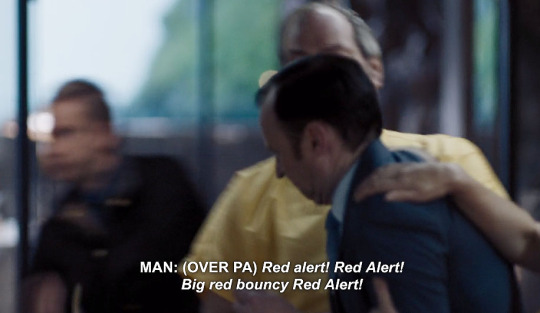
...and not ‘bury’ this show entirely just yet? I’ll leave you to your deductions. ;)
@ebaeschnbliah @raggedyblue @sarahthecoat @gosherlocked @sagestreet @tjlcisthenewsexy @221bloodnun @elldotsee @mrskolesouniverse @whimsicalethnographies @sherlocks-salty-blog @fellshish
76 notes
·
View notes
Text
Darker patches in an even darker past
TW: abuse relationship, violence "Sherlock, don't lie to me. You never really needed someone to split the rent with did you". John and Sherlock had been living together almost 10 years now, it occurred to John quite early on that Sherlock although a very guarded man was lonely. It then occurred later that the clients paid and not only that but paid large amounts. The pieces slowly fell together but John had just chosen to ignore it. After the recent Hospital stay from Sherlock and the fact they were both living off Sherlocks bank account and had been for at least 2 months and not taking any clients it did seem as though now was the time to ask. Sherlock seemed to tense up when John asked the question and John just couldn't work it out, why would Sherlock suddenly be so on edge after just a simple question about the acts he'd taken so many years ago. Every barrier he let down was put back up and John just couldn't see why. His Sherlock. Why would he do that, he knew that he could trust John, Didn't he? They were best friends and dare he say it edging on even more, why couldn't Sherlock just tell him what was going on. "Look John that was a long time ago and if you don't mind I'd care for a bath" Sherlock announced in what John called the 'Mycroft Voice' it was the one he used when he really wanted to get out of a situation. "Sherlock no, I know what you're doing but we can't do this right now we have to actually talk to each other" it seemed like a plea and really it was, john needed to be able to communicate with Sherlock, after almost 10 years of living in the same four walls they should be able to have these conversations. John knew that Sherlock liked to label himself and this "high functioning sociopath" but he wasn't that, he was trying to distance himself from what made us all human. The hurt, the pain, the laughs, the smiles, the tears. That was what Sherlock was trying to hide, he only knew part of the mans past, but enough to know why he felt the need to distance himself, with a brother who was always too far ahead and the parents who could never see Him. John felt like he was losing a never ending battle when Sherlock walked past his chair straight into the bathroom, would it be wrong of him to say this was harder than war, at least he got out of that alive, this one he wasn't so sure, he loved Sherlock..... he loved Sherlock, no not now, he can't do this now. He needed to talk to Sherlock he couldn't carry on living this way, a mess of unspoken words and dark patches in an even darker past. It was hours before Sherlock emerged from the bathroom and John hadn't moved from where Sherlock left him, he'd been thinking all that time but still had no idea what to say. "Look Sherlock... I'm not going to be mad at you I promise that, I don't want to know every detail of your past but I feel like I need to know this. You know that you saved me back then, when we first moved in with each other. But if you didn't need anyone to share the rent with then why did you pick to share a flat especially with someone like Me" John really didn't mean to turn this into a feel sorry for me rant but if it was the only way to get Sherlock to talk then he would roll with it. "Look John, please don't see me in a different light, the person I am hasn't changed" "What, Sherlock of course I aren't going to think different of you" "It's embarrassing, I know, but if you truly want to know..." "I do" "Well about 3 years before we met, there was a man that I met named Victor Trevor. He was kind, sweet and acceptably good looking by society's standards and I fell. I fell for him so hard, I didn't even know if he liked men the way I did, I was still young and I didn't know how to navigate these things Alone. Being who I am meant that I didn't have many friends and none of them would be able to help me with this. Believe it or not Mycroft and I used to be very close in our younger years. So I went to him because frankly he was the only person I trusted . He told me that Victor most likely wouldn't think of me in the same way because of my arrogance but if by the small chance he did to never let him go and always stay by his side. I tried talking to him normally, I really did try but I couldn't keep up the facade of the person I was not, when it slipped Victor was interested. It seemed like for once in my life someone liked me, I got too involved and soon enough we were living together and things were moving way too fast." Sherlock paused to catch his breathe, it seemed like he was going to cry and it was killing John "Sherlock, your okay, this is okay, I'm here and I'm not going anywhere" with a hand on Sherlocks the soft words were repeated until he found the strength to talk again. " I loved him John, I really did. I took him home to meet my parents our first Christmas together, It was terrifying because they needed to like him otherwise they'd more than likely make us break up. They did like him, a lot. On Christmas Day he went to talk to to his family on the phone and my mother told me that he was a keeper and to do everything I could to never lose him. But after a few months Victor dropped a facade too. It started small with small name callings, freak, machine, dickhead, that sort of thing, I was used to it though it didn't seem a massive issue and it really wasn't anything new. But then it got bigger he first time he hit me was after he'd had a long day at work and I forgot to do the one thing he'd asked of me, it was my fault really..." "Sherlock no you aren't blaming yourself.." "John please. He apologised, for so long he just kept saying he was sorry and tears fell down his face and I knew if I wanted to keep him I had to let it slide and just pretend it never happened. But I guess that slap was testing the waters, to find out if I'd run or if I'd just let it happen because after that things got a lot worse than a slap to the cheek. He kicked, pushed, hit, slapped and threw the nearest object at me. He threw cups, books, bottles, plates, and once a coffee table at me, but I let it go because I loved him, and mother and Mycroft told me to never let him go. It got worse though I wasn't allowed to take any cases from Lestrade, I wasn't allowed to see my family, wasn't allowed to talk to Mycroft at all, he took my phone I wasn't even allowed to leave the house most days, the one time I tried to sneak out while he wasn't home I got two cracked ribs and there was a dent in the wall the shape of my head. But I still did as mother said and didn't let him go. It went on for years, there wasn't a day I wasn't covered in bruises, scabs or cuts but he didn't even have to hide them where they couldn't be seen because no one would see me. After 2 more years Lestrade for some unknown reason called a drugs bust on the flat we shared, they walked in as a plate was thrown at my head because the food I'd made was inadequate and lord knows I was covered in bruises head to toe and suddenly it wasn't a drugs bust anymore. Victor was dragged out by one of lestardes minions and that was the last time I ever saw him, I offered to be a witness at the trial but they said there was no need and they had enough evidence as it was." "Oh Sherlock, I'm so sorry" "You have questions" "Erm yeah, I do. How long was this going on all together and I still don't know why you wanted to share the rent with me so quickly after all of what happened" "We were together for 2 years and 11 months and he was violet for 2 years and 9 months" "Wait we only met a month later and you still moved in with me so quickly" "Yes John, I trusted you everything about you was different from him, and yes you are right I never did need a flat share financially but I was scared. I hadn't lived alone been alone in 3 years and Lestrade never told me what happened to Victor, I was scared that he was still out there and he would come back for me. I'd never felt so vulnerable in all my life" The tears were rolling and rolling from both their faces and John just stood up, pulled Sherlock up with him and hugged him, and didn't let go, he held on for 20 minutes without an ounce of selfishness to it. And there was now another piece of the mans past that John held on to, trying to price together the dark patches of an even darker past. AHHHHH I FINISHED IT!! Tags: @straightasdeanwinchester @addignisherlock @88thparallel
#tw abuse#tw abusive partners#tw abuive relationship#tw violence#i wrote this#victor trevor#Sherlock Holmes#john watson#johnlock if you squint#maybe#idk#hurt Sherlock#angst#so Angsty#bbc sherlock#Sherlock fic#fan fic#angst fic#Sherlock angst#johnlock angst#benedict cumberbatch#Martin freeman#sherlock fanfic#sherlock angst
48 notes
·
View notes
Text
TFP is Mind Palace – Sherlock’s coming out
What if… Sherlock imagines his coming out in TFP? Just my reading of it, but full of hope – please let me walk you through it in my different posts to proof it. Expecting your comments.
What if TFP is exclusively is in Sherlock’s mind palace where he comes to his terms about his emotions by road-testing his feelings and what exactly ‘coming out of the closet’ would mean and feel like for him and the people important to him (John, Mycroft, Molly, his family)?
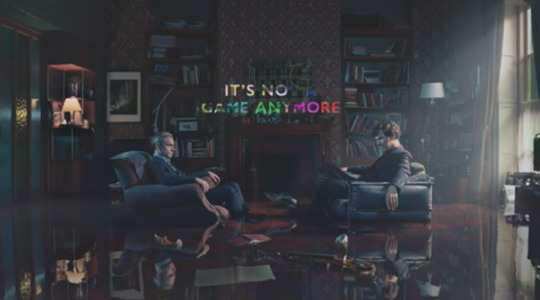
But for Sherlock who trained himself his entire life to repress his emotions, it would need a strong trigger, to break his old pattern of hiding feelings behind rude behavior. If John would be fatally injured and Sherlock is not aware if he will pull through, this would be the strongest trigger I can imagine.
We don’t know if John is really been shot yet, but the last scene of TLD is red (start of the new storyline ‘Rouge’, which we will explore later – hopefully 8th of March we get a teaser when the expected 4th episode will air that will reveal the truth?) and we did not get a proper answer, as the next episode TFP is all in Sherlock’s head (mind palace), like TEB.
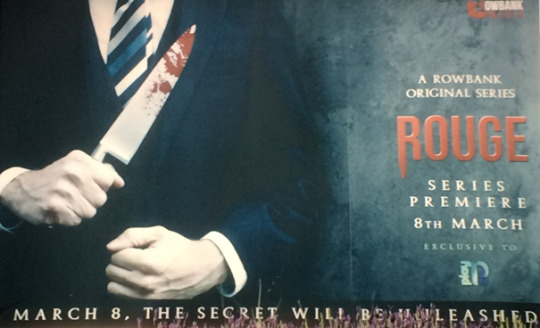
Because I felt so miserable after TFP first, I watched it several times and started to go through this episode scene by scene in different posts (Mycroft’s residence scene, 221B Baker Street (3/3)) to point out why it is mind palace, and did much research in the details like Oscar Wild and Lady Bracknell the pictures at the wall – all that subtext is about gay people and how society deals with it (feel free to check it out. I am still on it to post the next scenes, but the subtext is so rich and full of information, it takes ages to do the research – and as I’m no native speaker, I will miss a lot hope you guys can help me with this.)
John getting shot and survives is cannon in ‘The adventure of the three Garridebs’ Sherlock is panicking and takes care of him ‘It was worth a wound, it was worth many wounds, to know the depth of loyalty and love which lay behind that cold mask." This is what John writes in ‘The Strand’ after that event. I don’t think that the writers will miss the opportunity to show us Sherlock suffering about John’s life!!!
To find a solution how to save John Watson (TLD – Mary’s message) he is using his mind palace to find out how he can provide his feelings to him, before John maybe dies without knowing. We know that Sherlock works the best when he is under (emotional) pressure.
Remember Sherlock saying in A Study in pink: “Bitterness is a paralytic – love is a much more vicious motivator”.
Before he met John, he was bitter and alone. With John in his live, everything changed, John humanized him, changed him to the better! If he loses John, he has no reason to change anymore, he (maybe) would become the same bitter person like he has been before John.
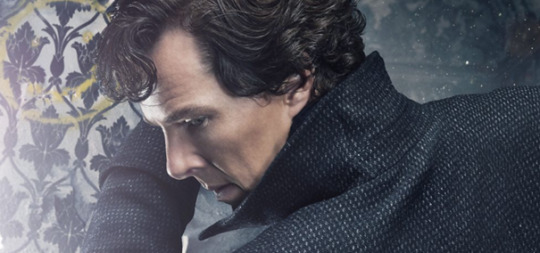
This time, Sherlock wants to make it right, he is asking for help at the end of T6T, but not Mycroft, as he is aware that he can’t teach him anything about feelings. So he asked the only person, who really knows John, which is Ella, John’s former therapist, what he can do about John. Ella tells him, that therapy can only work, if Sherlock is opening up. Sherlock replays, that this is not his style – and we get no more information, if he did it or not.

Coming out is not about one moment, just one kiss and everting is fine. It is a process that starts in the head (mind). You first need to find out, who you are, and that can be a really painful thing. The next steps are to accept yourself the way you are. Then you are out with yourself, you learn to live with it. After that you need to decide, if you go further and maybe tell it to your love interest, or to your parents, to free yourself. At this point, many gay people are in therapy, because their parents, relatives, friends or people at work do not understand the pain you are going though, just to be yourself without hiding a part of yourself. If you find enough acceptance here, your next step could be to publicly come out if it is silently while holding hands or kissing your friend in public and watch the reaction of the people surrounding you or by making it public as a statement on a party or something similar. I think most of the LGBT people do not get to this point to make it officially public, because they are too afraid of it. And this is why we are surrounded by LGBT people every day that we do not recognize. But if we start to watch silently, hear and read the subtext of their behavior, or short comments, we will get a glimpse of how many there are amongst us. But why do they hide? – Because you need a strong self-believe and self-confidence to be strong enough to resist being hurt every time that people show you that they do not understand or accept you. Also it depends on the country you live in, still today, there are countries that will arrest you for being gay or even kill you. So some LGBT people need to hide their entire life. Also the society does not accept you the same way that straight people are accepted and maybe you do not get the job you like, because people know, that you are gay. Or you live in a religious community, where there is no room for diversity.
Coming out is a unique experience for each person, who needs to go through this kind of process.

Bearing that in mind, think about that Sherlock is probably 40 now, like Ben is, and it is the first time in his life, that he allows himself to research his feelings so deeply. He was always aware that he is gay. But what does this mean for him before and now? He grew up in the Thatcher era and during the HIV/AIDS crisis. It felt different in that days to be gay. Stars like Freddy Mercury never had an official coming out, it has just been the rumors in the press until he died. Also we get reliably informed, that Sherlock never had sex or a relationship before, in his live. So imagine how difficult it might feel to start at this age to learn about yourself.
It is painful for Sherlock to go back in his life to find out, why he is emotional contained and what he is afraid of, as he ‘deleted’ those things from his hard drive, buried it deep inside to have more space for other ‘useful’ information. Sherlock’s childhood that changed him from an emotional kid to an almost always rude thinking machine. We learn, that it has something to do with REDBEARD and that it is an alternate story that Sherlock told himself to be able to cope with the truth (which truth?). He needs to find out what it was to find inner peace with himself first. I guess we have not seen the correct Victor Trevor story yet, I assume, he was Sherlock’s first ever love interest and there will be a different story told in a later episode.
To find out more about his life today, he needs to go back there. Therefore Sherlock creates different rolls and characters for a play in his mind palace:
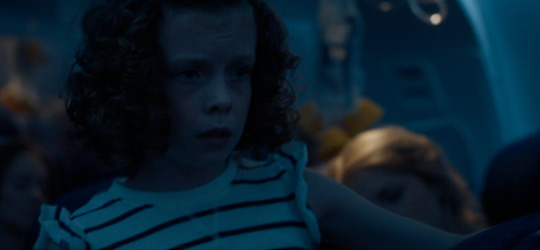
The little girl on the plane represents his subconscious, and his emotions that are still disconnected from his today reality, so he is still incapable to show feelings to others properly (timing). He needs to find access to this resource.

Moriarty he is only a voice in his head, but he is the devil, the virus in his data. He is always pushing him to make decisions, he does not want to make, decisions that separates him from John.
The little girl and Moriarty are like the angel and the devil on his shoulders, like yin and yang.
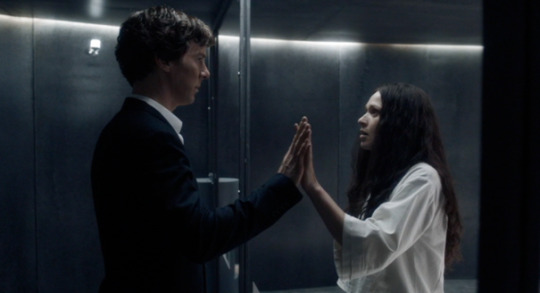
EURUS is a fictive character for his (evil) logic, emotionless side. He needs EURUS to confront himself with several topics, to put himself to tests, to find out about how the both most important people in his life will react in different situations. Those two people are
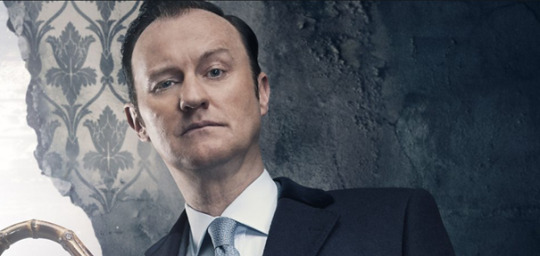
Mycroft, his brother that is protecting him since childhood by teaching him that caring is not an advantage and that he should join not getting involved in any friendship or romantic entanglement, because this could hurt him. But Mycroft has also selfish interests, because if Sherlock would be officially out, this could (maybe) ruin his career in the British Government – so I had always the feeling, that he wanted to see his brother happy with John, but might have an interest to keep it as a secret. Mycroft is aware that Sherlock is gay.
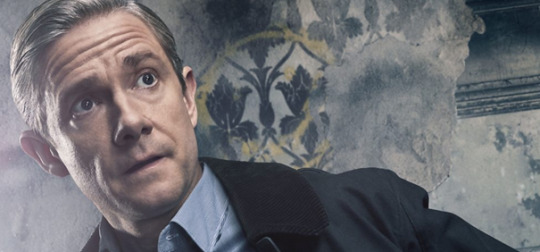
John, who Sherlock is in love with, since he met him. He knows about Johns feelings for him at least since the Battersea scene in A Scandal in Belgravia, but as John is always dating women (and marries a woman) to cope with his unrequited love for him (Sherlock seems always to be unavailable for John) Sherlock fears to tell John the truth. He is not sure if John is straight and only his best friend or if he is Bi. Therefore he researched Major James Shoto, because he needs to know, if John is romantically interested in men, too.
He needs to find out about how John could possibly react, when he confesses his love, while he is unsure, he expects John to make the first move as he is much more experienced in romantic entanglement than he is.
We can see that in TFP in the most painful and emotional scene, when Sherlock askes Molly (she is always a stand in for John) to say ‘I love you’. As Molly turns the way around and asked him to tell it first ‘say it, like you mean it’ he comes to the conclusion, that John will never ever say a word, because it is true and he is insecure, too. We see John in tears, when Sherlock finally says ‘I love you’ – he is waiting instantly to hear it from Sherlock. So Sherlock cannot expect John to say anything, as he is too afraid about himself, hiding his bisexuality.
As Sherlock kept everyone in the dark about his sexual orientation, even John, he needs to be the one who is telling John, how he feels first.

Also in this scene, he comes to the conclusion that he must tell Molly that he is gay, to save her from the pain he is causing her while she is still in love with him unable to move on.
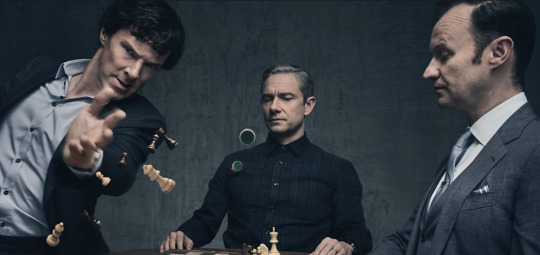
It is not a Game anymore – If it is true, we can stop to play around the subject and tell everyone :-)
Mark Gatiss knows about the pain that LGBT people feel - so I don’t think that he wanted to hurt any feelings by not getting it right.
– Please think about it. If you read TFP as Sherlock’s coming out, than we can expect to see all what we desired later.
To see Sherlock and John as a happy couple, experiencing a proper romantic relationship, there are some steps missing, which we can expect for S5 (hopefully).
But first Sherlock needs to:
heal his inner child (plane landed safely, TFP)
stabilize his emotions to complete himself (reconnecting with Eurus, which we can see during the violin play in TFP finishing scene)
He needs to tell John
He needs to tell his family (shown in the TFP final scene)
He needs to tell Molly
John has to come out, too (will be difficult for John)
They need to tell their friends
Coming out in public?
Of course, they are ‘coming out’ ;-))))
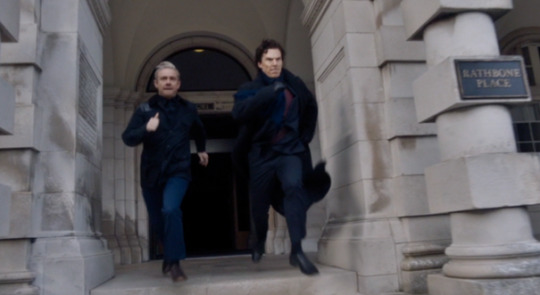
Please reblog if you agree with me and think I got it right.
#tjlc#tjlc is real#tjlc explained#tjlc is canon#bbc sherlock#sherlock#johnlock#john watson#rouge#tfp#worriesconstantly#jenna221b#@worriesconstantly#@jenna221b#coming out#the final problem#@the-seven-percent-solution @anonymous
20 notes
·
View notes
Text
Welcome back everyone to my Psycho Pass watch-a-long with Matt! I’m surprised by how few bloggers seem to be watching this series but that’s o.k. Small parties are the funnest! Also, my week has been a killer so I don’t want to go to some huge party! Next week is gruesome too but after that, it should ease up – YAY! So how has your week been Matt?
I’ve been a bit unwell but I’m sure the people who come to read this aren’t interested in the details of my health, on with the review!
I’ll be honest with you guys, I really didn’t take as many notes as I usually do so I may skip over some things but here are the things that stood out to me.
I loved that bank fraud and market manipulation in the form of a manufactured housing bubble was the initial crime. And explained in such detail as well. It was amazing! Financial crimes in Psycho Pass is something I really hope they explore more. Because people’s relationship with money, especially in a society that has no poverty, is probably quite different than their relationship with violent crimes. I wonder what it does to their hues! What did you think Matt?
It’s funny I was watching these parts thinking “man, the writer of this series must have just discovered about the 2012 financial crisis and housing collapse in the US and felt compelled to write about it… either that or they’d just watched ‘The Wolf of Wall Street’ and ‘The Big Short’.” Not a bad thing, of course, it was very interesting and conveyed well, just a little bit obvious. There were also mentions of election fraud and manipulations…it was a pretty topical episode.
At one point, we see Arata jumping around rooftop with a cord tied to him, as Kei is infiltrating the criminals’ stronghold. That action sequence was spellbinding. I really enjoyed it. How about you?
I loved it, simple yet immaculately choreographed and executed parkour.
So the white colour crime got wrapped up quickly but rather gruesomely and just as Kei and Arata are chasing after the main criminals, bam, familiar faces. We get a Ginoza and Kogami (reunited again!) double whammy cameo. I recognized them both instantly and my heart did that little nostalgia squeezy thing. And I do love seeing them but I’m not sure how I feel about the constant callbacks. They feel a little “fanservicy”. I think I would have been happy with a glimpse of Akane and then let this be its own story.
It’s gotta be hard for a series that’s got so many ardent fans to both please them with enough call-backs to the things they liked about the first season while simultaneously introducing the new. I’ve been fine with it up to this point, but I don’t think they need to go as hard about the call-backs going forward.
Also, I must say, there were a few moments during this sequence and the conversation with Mika afterwards where I think I really missed something because I have not seen season 2. Did you know that Nobu and Ko were working as partners again and for Foreign Affairs at that? They don’t seem to be latent criminals (or at least are not being treated as such). Have we ever seen that blonde before? They kept making cryptic references to Akane as if she was an urban legend…Cause all of this came as a confusing surprise to me.
I have an absolutely terrible memory so unfortunately you’re asking the wrong person. I barely recognized them as returning characters until the show spelled it out for me (yeah, yeah I know I’m pretty bad at this).
Having wrapped up their first case, the second half of the episode switched to a new one. Investigating a supposed suicide. The hotel staff that discovered the body as well as any witness had their Psycho Pass deteriorate and are now probably stressed out because of that and I realize that Sybil is just the ultimate victim blamer. Something bad happened to you, better not let it get you down – or else!
That’s always been my number one complaint (maybe) about the Sybil system in general, the idea that innocent bystanders can get their hue deteriorated to such an extent just by witnessing something–hardly seems fair–but I guess that’s the point this series has always been making.
I got to say, I still feel like the mind trace is a bit of a gimmick. Not necessarily a bad one and I enjoyed it in this episode a lot more than in the last, in fact, I wished it had lasted a bit longer, but nevertheless, it feels awfully convenient.
I still like it, I think it’s unfair to judge the quirks and abilities of people who see the world differently than the lay person, maybe there are people like this in our real world and we don’t hear about them because their abilities like ‘absolute empathy’ are things that aren’t measurable by modern science. I don’t find his abilities to be cheaty any more than a character who has a genius intellect, it’s just something they can do better than everyone else.
I’d just like to say, I’m only judging it as a narrative device. As a character trait I like it. But I find that so far it does take something away from the investigation aspect as the long hard job of gathering clues and making deductions basically wrapped up in 2 minutes instead and in a way where the audience isn’t given a chance to figure out the mystery along with the character because everything is just given in direct exposition.
I mean sure I guess that’s a concern but I’ve never been one to try and be smarter than the show I’m watching. I’m just happy for it to unfold however the writer wants it to unfold, if that means me solving the crime before the characters do and feeling smug about it then so be it but if that means me being stupid too then thats okay too.
Really? Trying to figure out who the killer is has always been one of my favourite things about mysteries! I’m pretty sure authors pride themselves on leaving just enough clues for people to figure it out but presenting them in a way where we don’t think of it right away because we get wrapped up in the story! Even when I do figure it out though, I doubt it makes me smarter or even anywhere near as smart as the writer. Creating a mystery is way harder. Besides, I’m wrong most of the time but its fun trying, you know? I wouldn’t people who enjoy trying to solve puzzles are doing it to feel smug. I just think they like puzzles. Maybe I’m being naive.
Seeing the history of the idol Karina and how every step of her path was dictated by Sybil in a parallel with the Sybil approved man vs machine MMA fight that ends with shouts to the glory of the system, was a bit of a shock. I never got to see much of everyday life in the Psycho Pass universe but what I remember is fairly normal, very peaceful and full of holograms. That was the brilliance of the system. There was no need to make the population obedient either through force or propaganda because they were perfectly content. Sybil’s control was through comfort and safety.
This was a much more obvious and forceful depiction of a rather stereotypical dystopia and I think it makes the story a little weaker.
I’ve always felt the Tokyo of the ‘Psycho Pass’ series was incredibly dystopic, to me it’s a world that on the surface looks like a law-abiding peaceful place but is run by a system that’s so counter-human that everybody is living on edge–always afraid of something going wrong or seeing something horrible that might cloud their hue. The revelation of a character being almost raised by Sybil to be a perfect personality and then later become a politician seemed very in-line with what this universe has shown. Sybil works by controlling everyone, even down to what’s popular, who’s famous and who’s in power.
On the other hand, Karina seems like a wonderful potential antagonist. Honestly, I got excited but the little of the character we did get to see. I was even a bit bummed out when the episode ended. And it took me by surprise which is impressive considering these guys are double the length I’m used to.
She was great, wasn’t she? The idea that she’s almost like a Moriarty-esque equal to Arata’s Sherlock is going to be something that I really want to see a lot more of!
I know I nitpick and point out aspects I enjoy less. I did like the latter half considerably more than the first in this episode. But all in all, I am really liking the start of Psycho Pass season 3. I can’t wait till the next episode. Had it been available, I would have watched it right away. What are your thoughts so far Matt?
I agree, the second-half of the episode had a lot more going for it overall and is looking to push this show in a lot more interesting directions especially as politics are going to be involved. One thing I didn’t get to mention in last week’s review but is still exceedingly relevant here is how glad I am that these episodes are all double-length the normal anime length. The added time helps this show greatly as it allows you to fully immerse yourself in this world and allows for a lot more information to be imparted in one go. To binge watchers this’ll be hardly noteworthy but in watching week to week it helps. Overall I think I liked this episode even more than the first episode and if things continue along at this quality we could have some stiff competition to the first seasons’ crown.
Psycho Pass s3 ep2 – The Hand Off Welcome back everyone to my Psycho Pass watch-a-long with Matt! I’m surprised by how few bloggers seem to be watching this series but that’s o.k.
0 notes